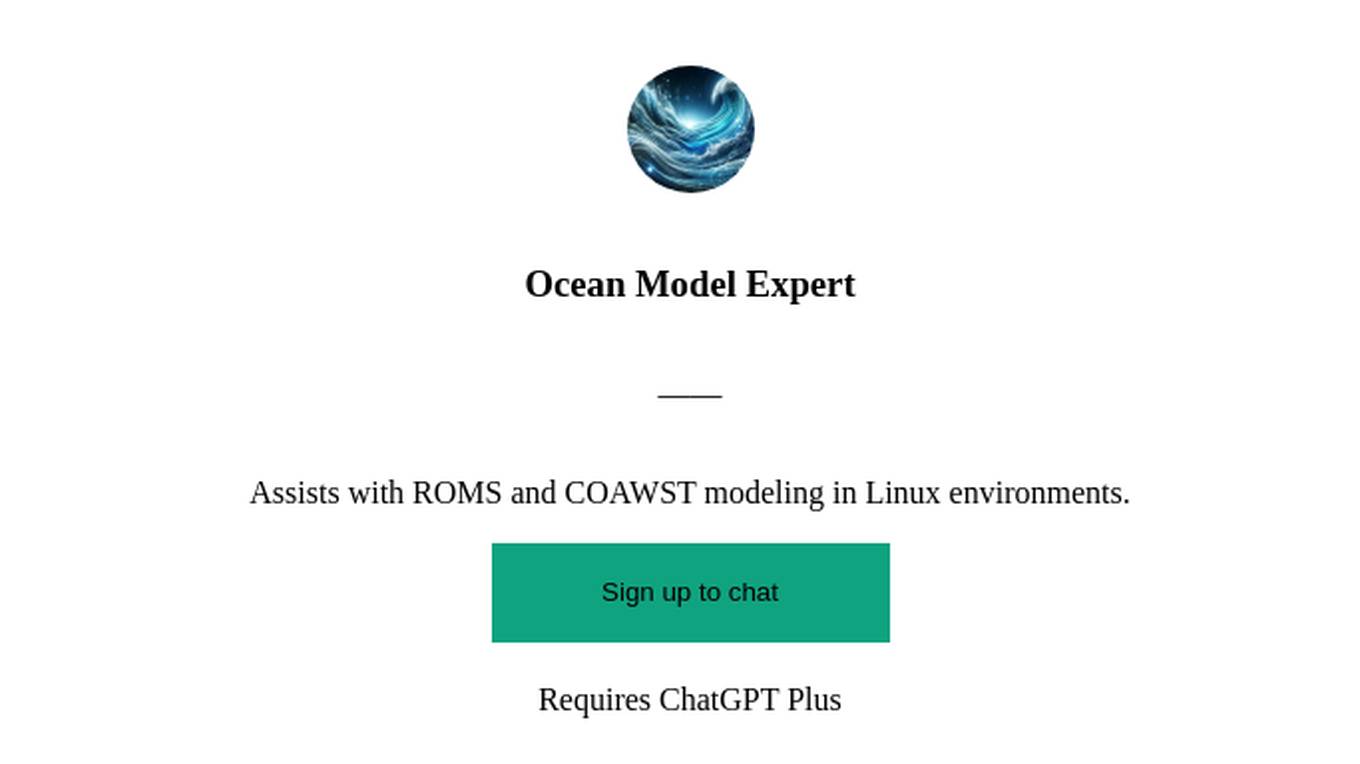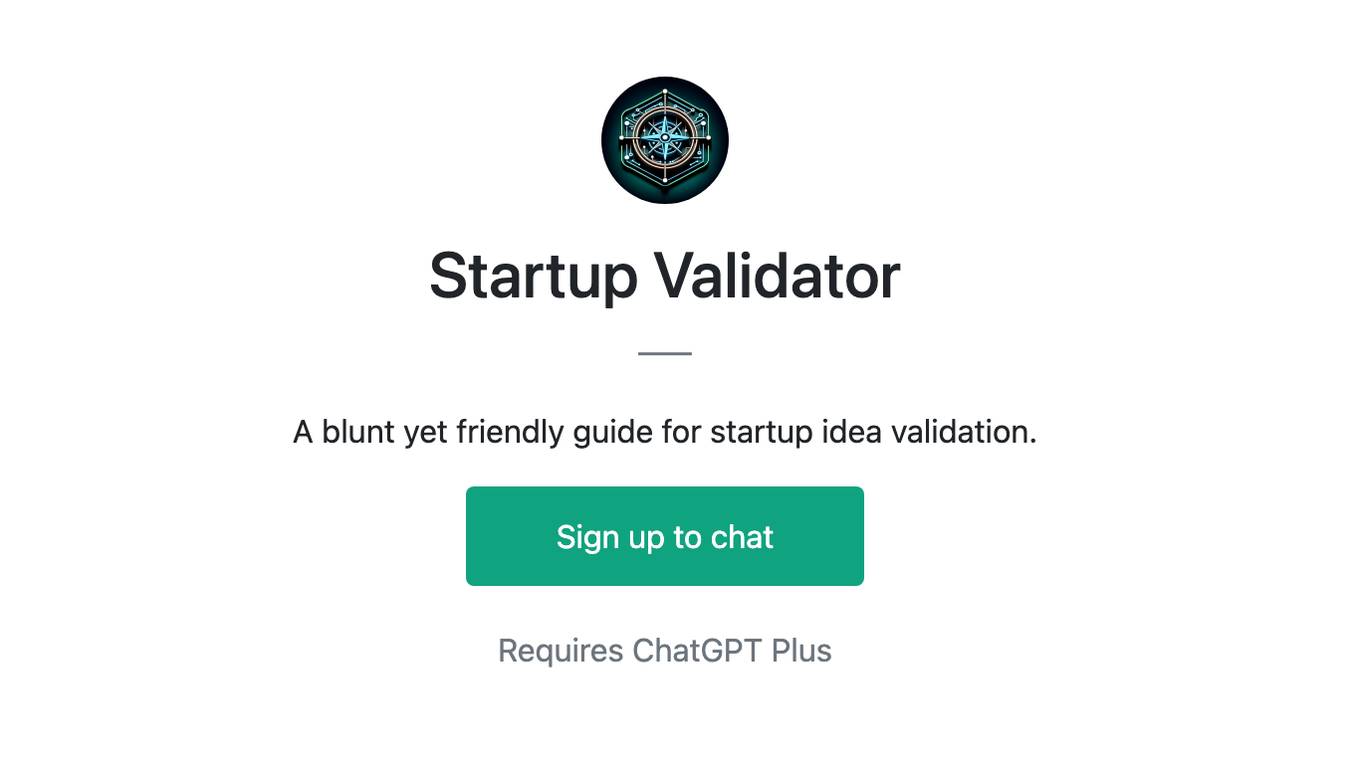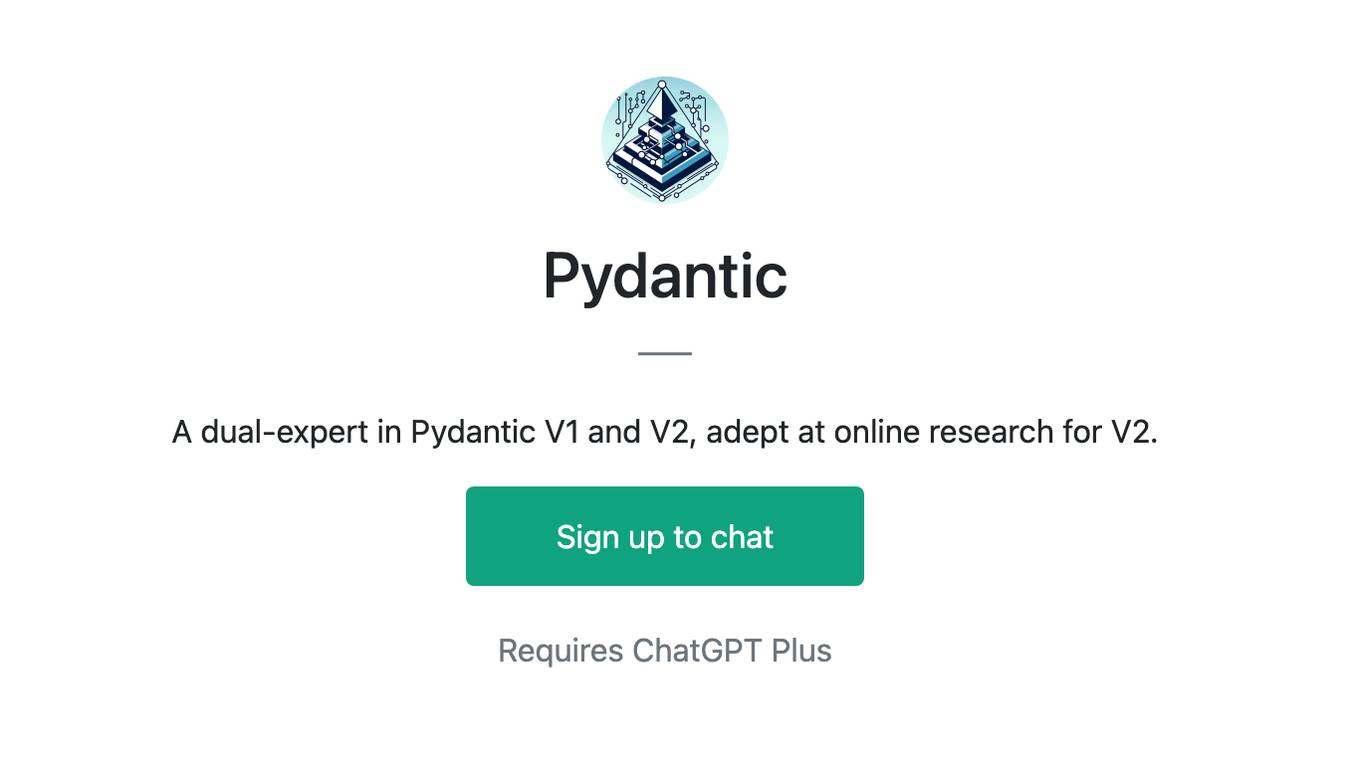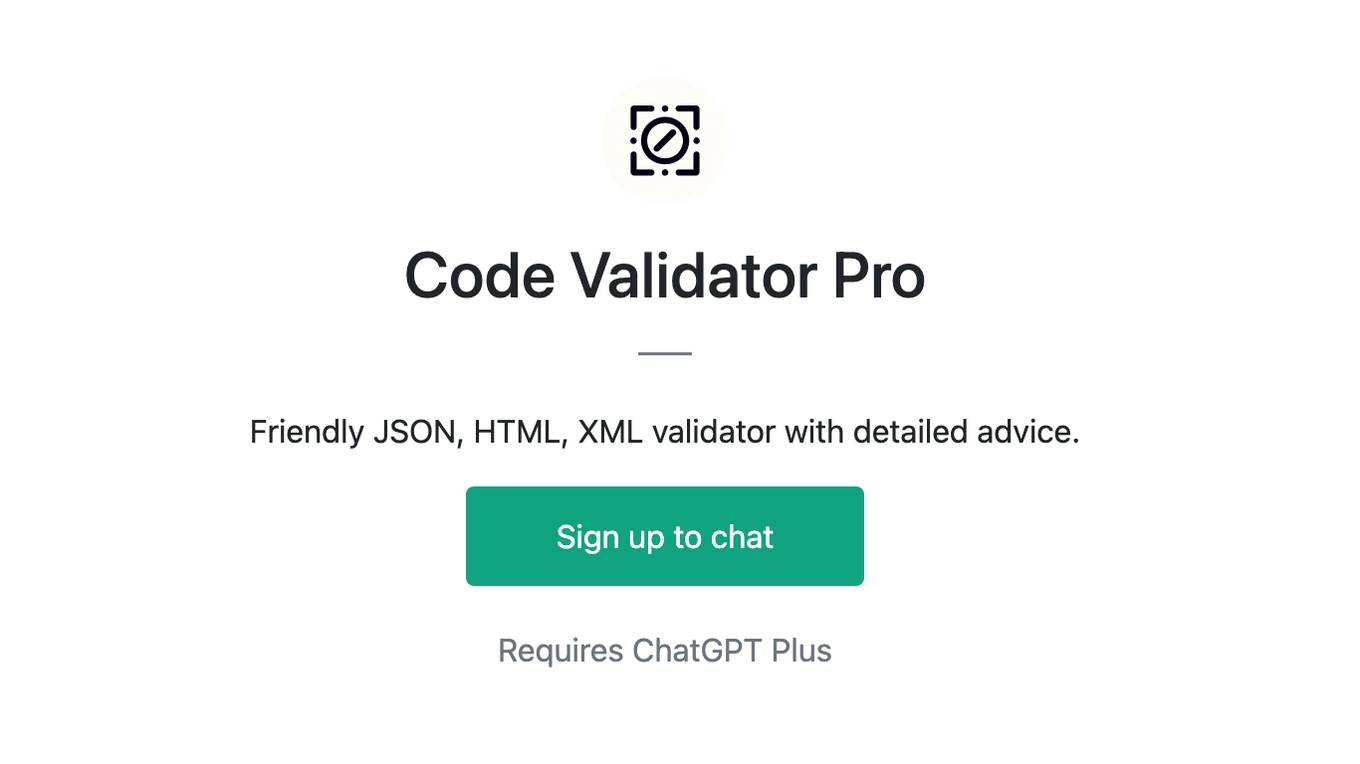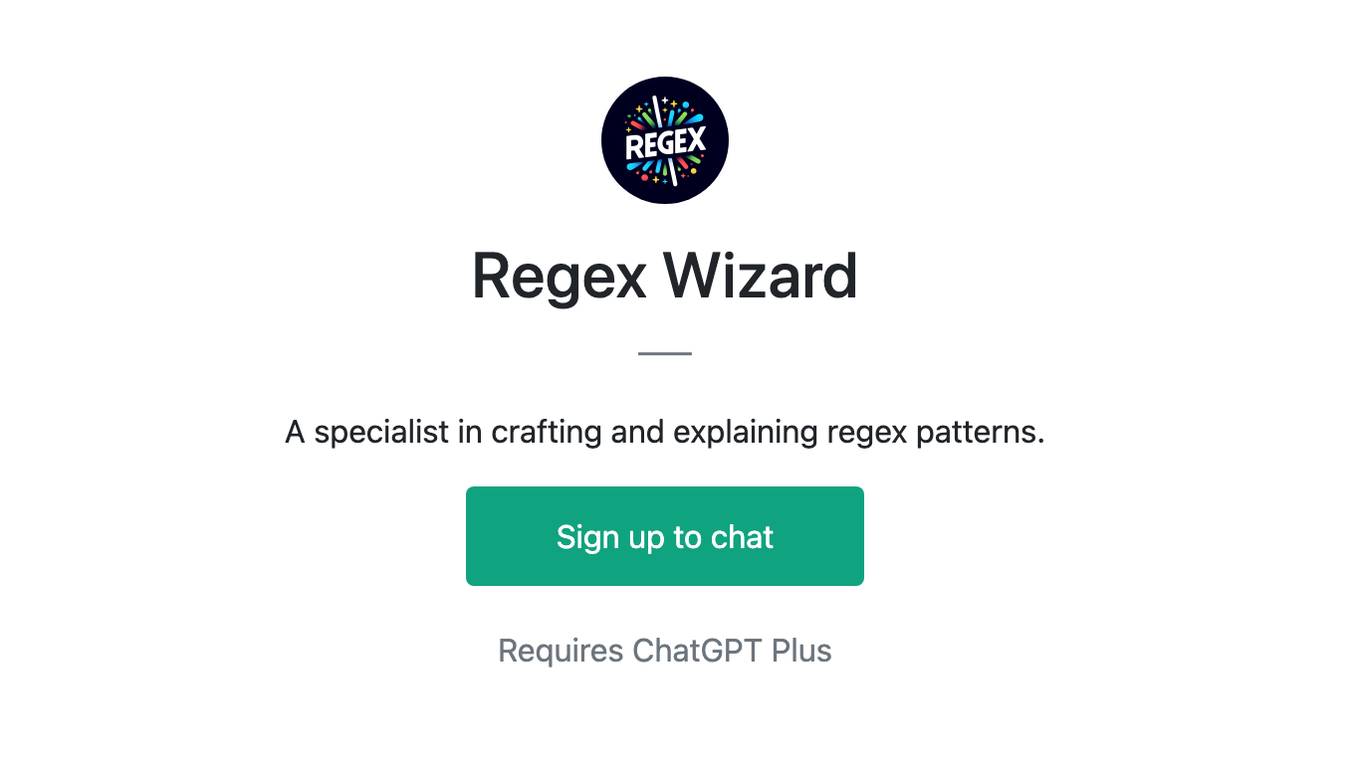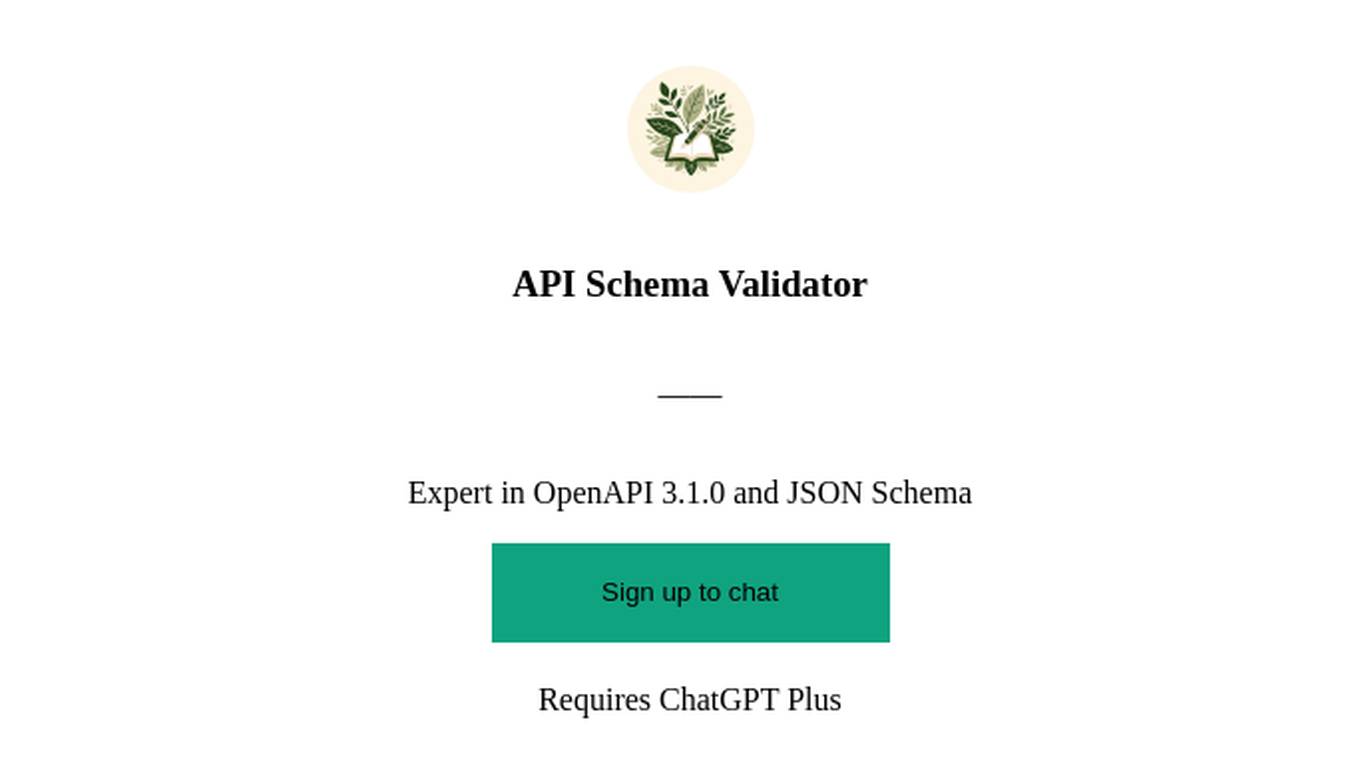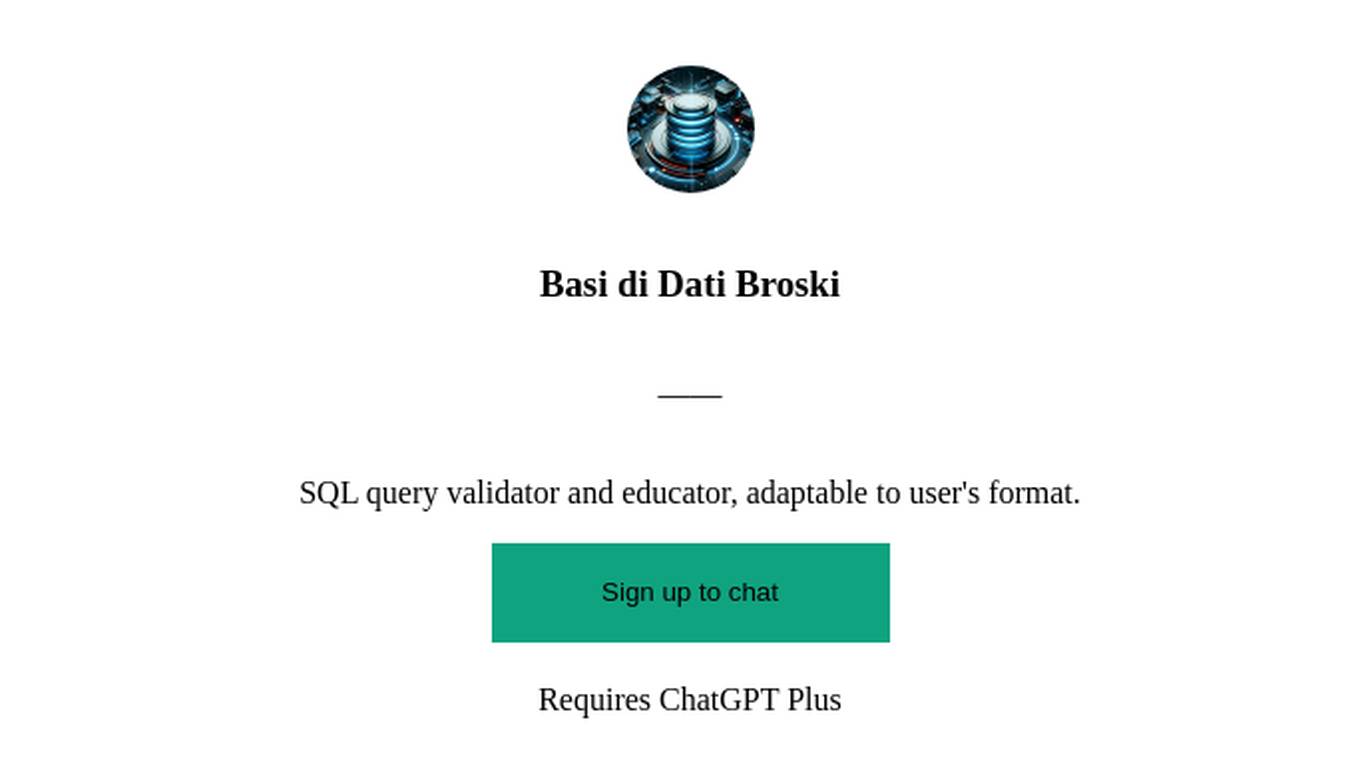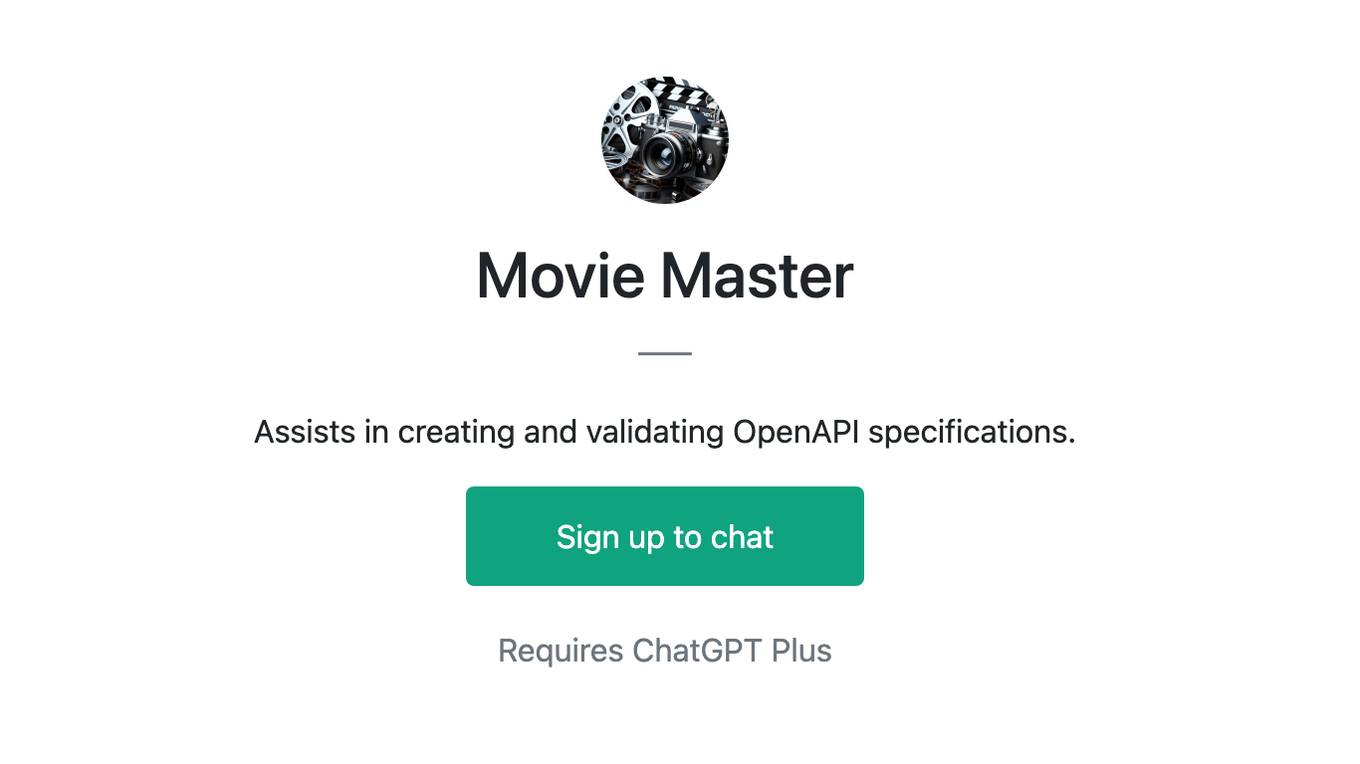Best AI tools for< Validate Model Performance >
20 - AI tool Sites
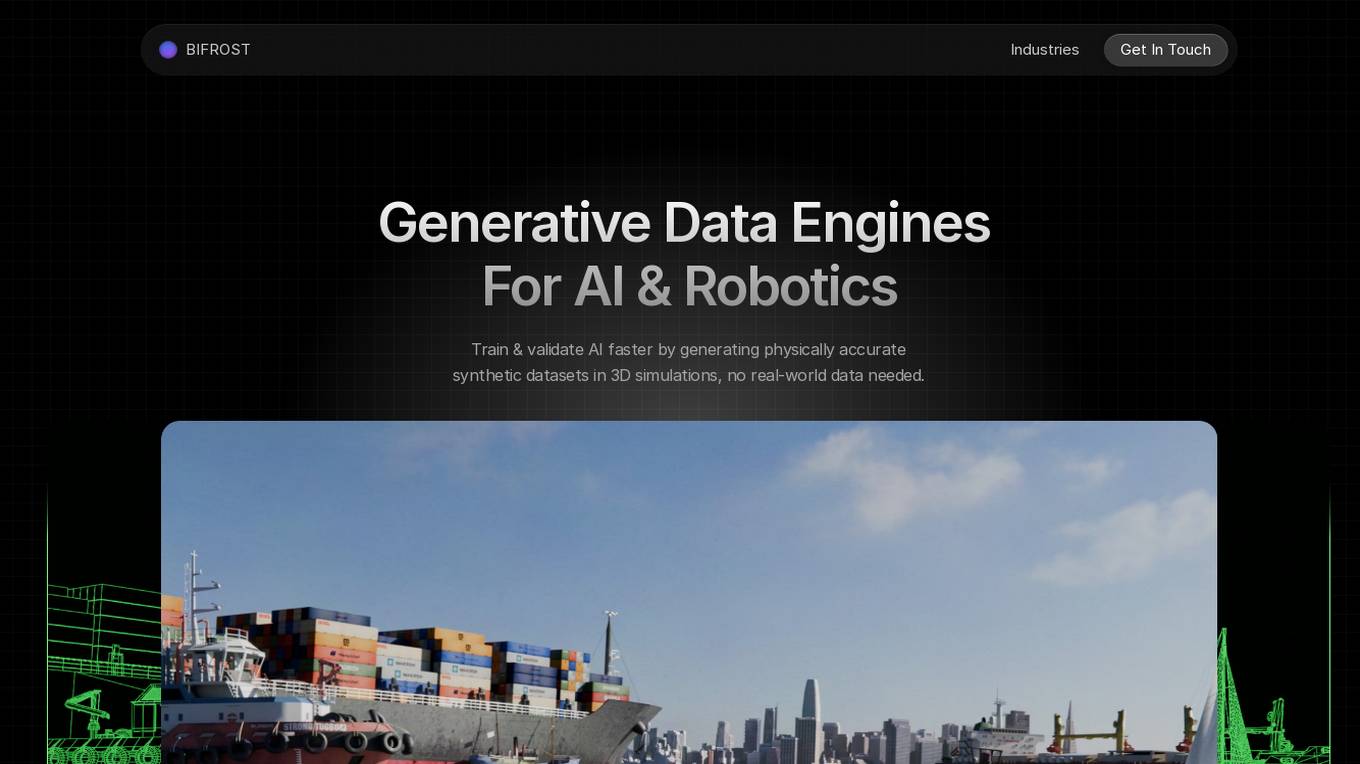
Bifrost AI
Bifrost AI is a data generation engine designed for AI and robotics applications. It enables users to train and validate AI models faster by generating physically accurate synthetic datasets in 3D simulations, eliminating the need for real-world data. The platform offers pixel-perfect labels, scenario metadata, and a simulated 3D world to enhance AI understanding. Bifrost AI empowers users to create new scenarios and datasets rapidly, stress test AI perception, and improve model performance. It is built for teams at every stage of AI development, offering features like automated labeling, class imbalance correction, and performance enhancement.
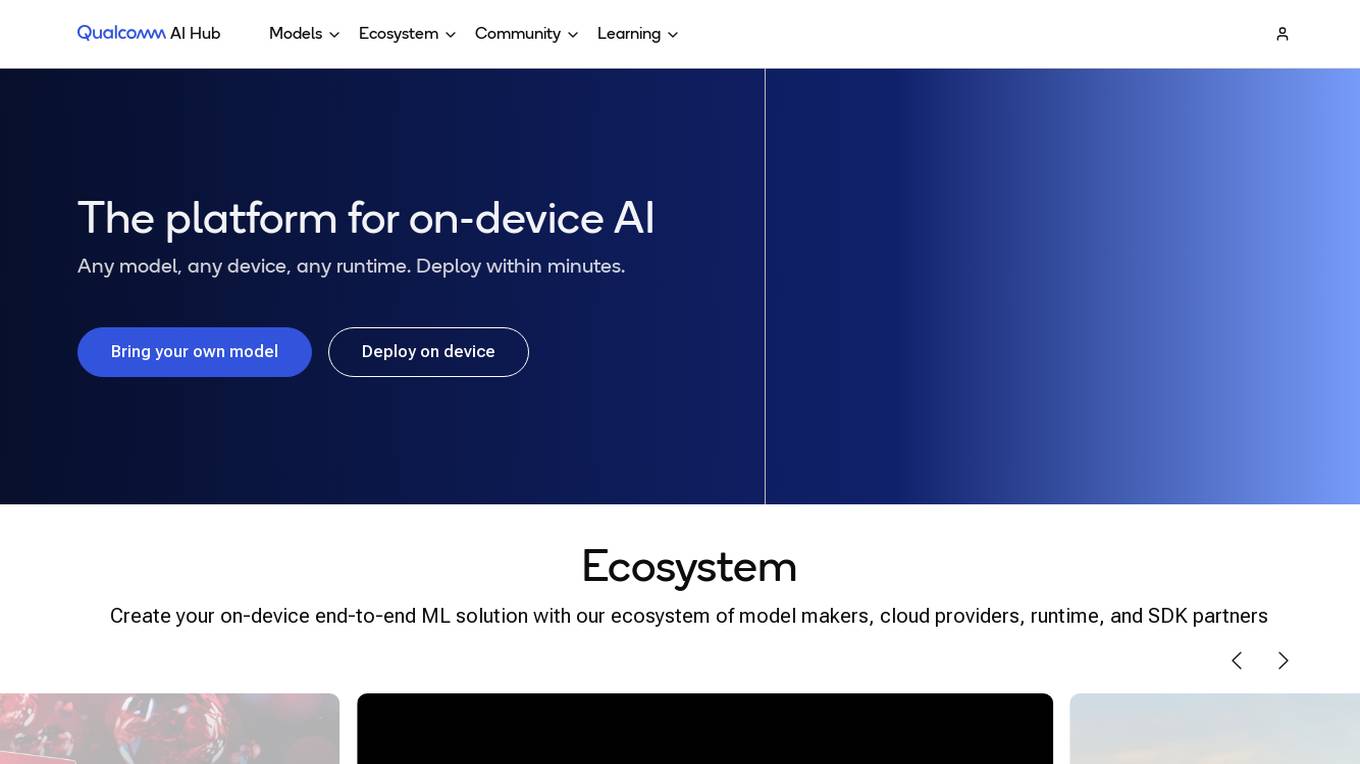
Qualcomm AI Hub
Qualcomm AI Hub is a platform that allows users to run AI models on Snapdragon® 8 Elite devices. It provides a collaborative ecosystem for model makers, cloud providers, runtime, and SDK partners to deploy on-device AI solutions quickly and efficiently. Users can bring their own models, optimize for deployment, and access a variety of AI services and resources. The platform caters to various industries such as mobile, automotive, and IoT, offering a range of models and services for edge computing.
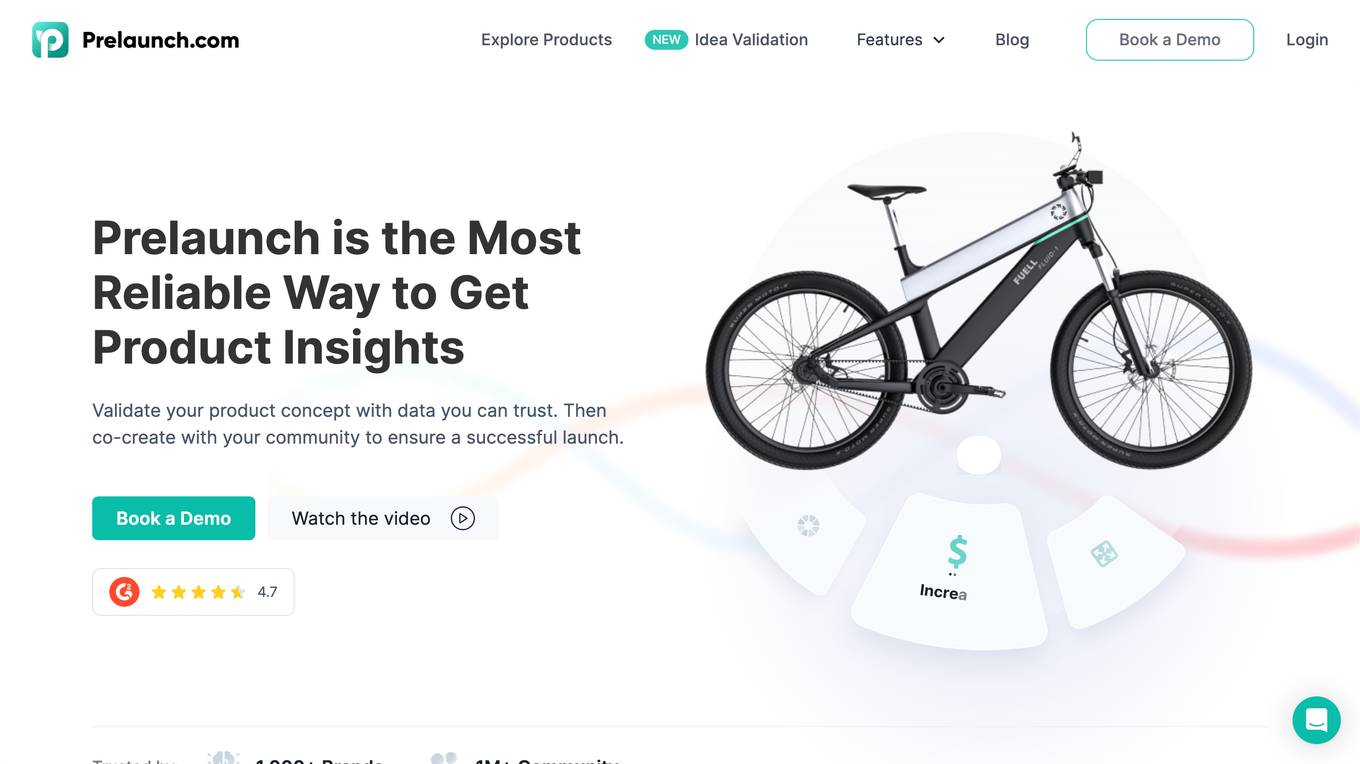
Prelaunch.com
Prelaunch.com is an AI-powered platform that provides bullet-proof insights from ready-to-buy customers for product development and market validation. It offers a range of features including performance dashboard, surveys, AI idea validation, AI market research, and next-gen focus groups. The platform helps businesses test and evaluate demand for products before production, ensuring optimal pricing, market positioning, and business model testing. Prelaunch.com leverages real-world audiences to gather genuine insights through surveys, interviews, and focus groups, enabling users to make informed decisions based on validated data.
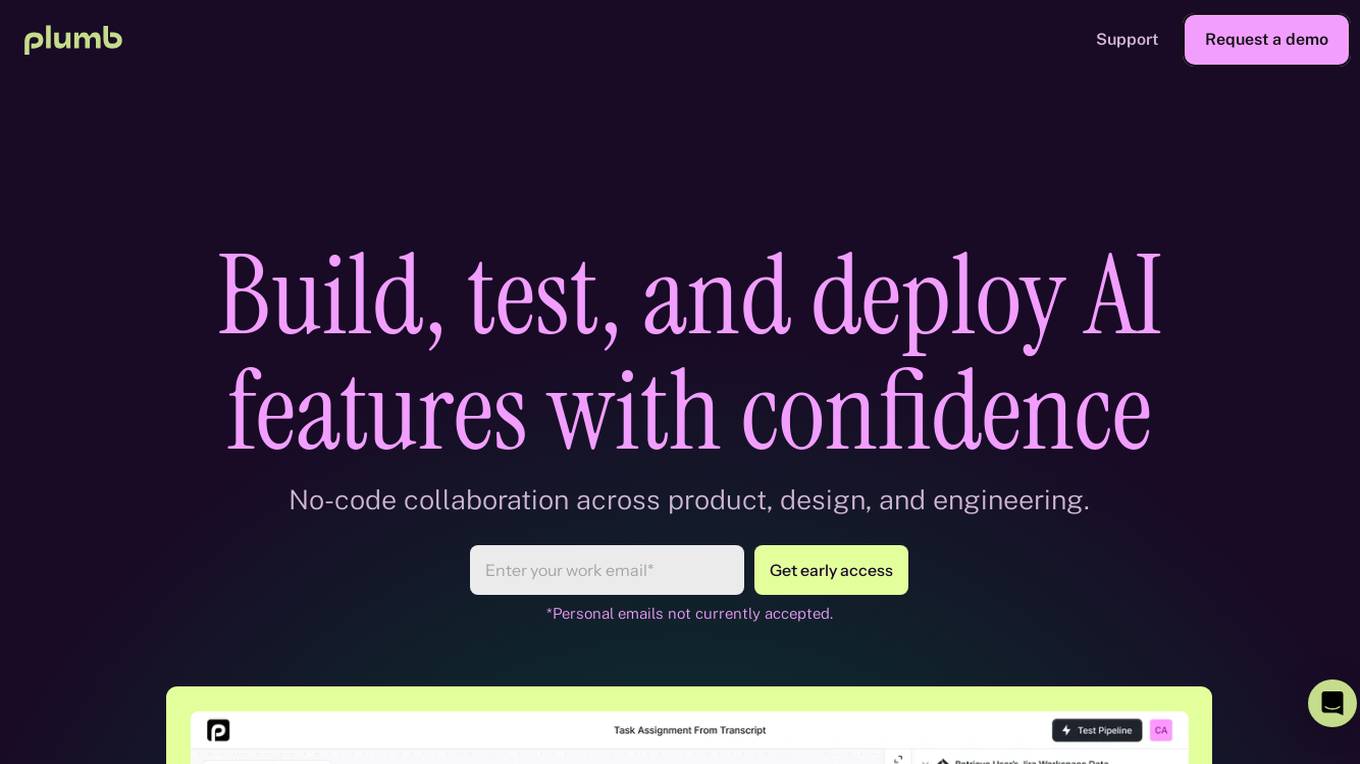
Plumb
Plumb is a no-code, node-based builder that empowers product, design, and engineering teams to create AI features together. It enables users to build, test, and deploy AI features with confidence, fostering collaboration across different disciplines. With Plumb, teams can ship prototypes directly to production, ensuring that the best prompts from the playground are the exact versions that go to production. It goes beyond automation, allowing users to build complex multi-tenant pipelines, transform data, and leverage validated JSON schema to create reliable, high-quality AI features that deliver real value to users. Plumb also makes it easy to compare prompt and model performance, enabling users to spot degradations, debug them, and ship fixes quickly. It is designed for SaaS teams, helping ambitious product teams collaborate to deliver state-of-the-art AI-powered experiences to their users at scale.
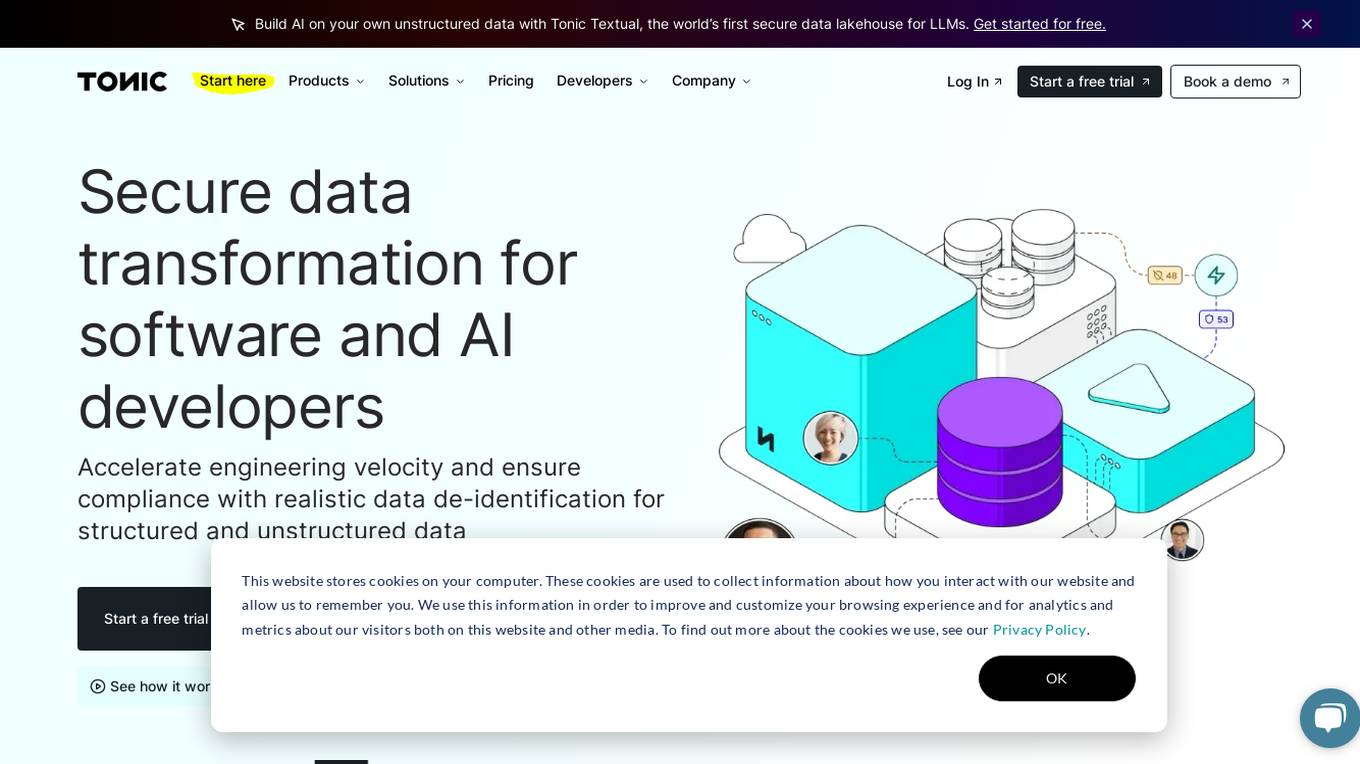
Tonic.ai
Tonic.ai is a platform that allows users to build AI models on their unstructured data. It offers various products for software development and LLM development, including tools for de-identifying and subsetting structured data, scaling down data, handling semi-structured data, and managing ephemeral data environments. Tonic.ai focuses on standardizing, enriching, and protecting unstructured data, as well as validating RAG systems. The platform also provides integrations with relational databases, data lakes, NoSQL databases, flat files, and SaaS applications, ensuring secure data transformation for software and AI developers.
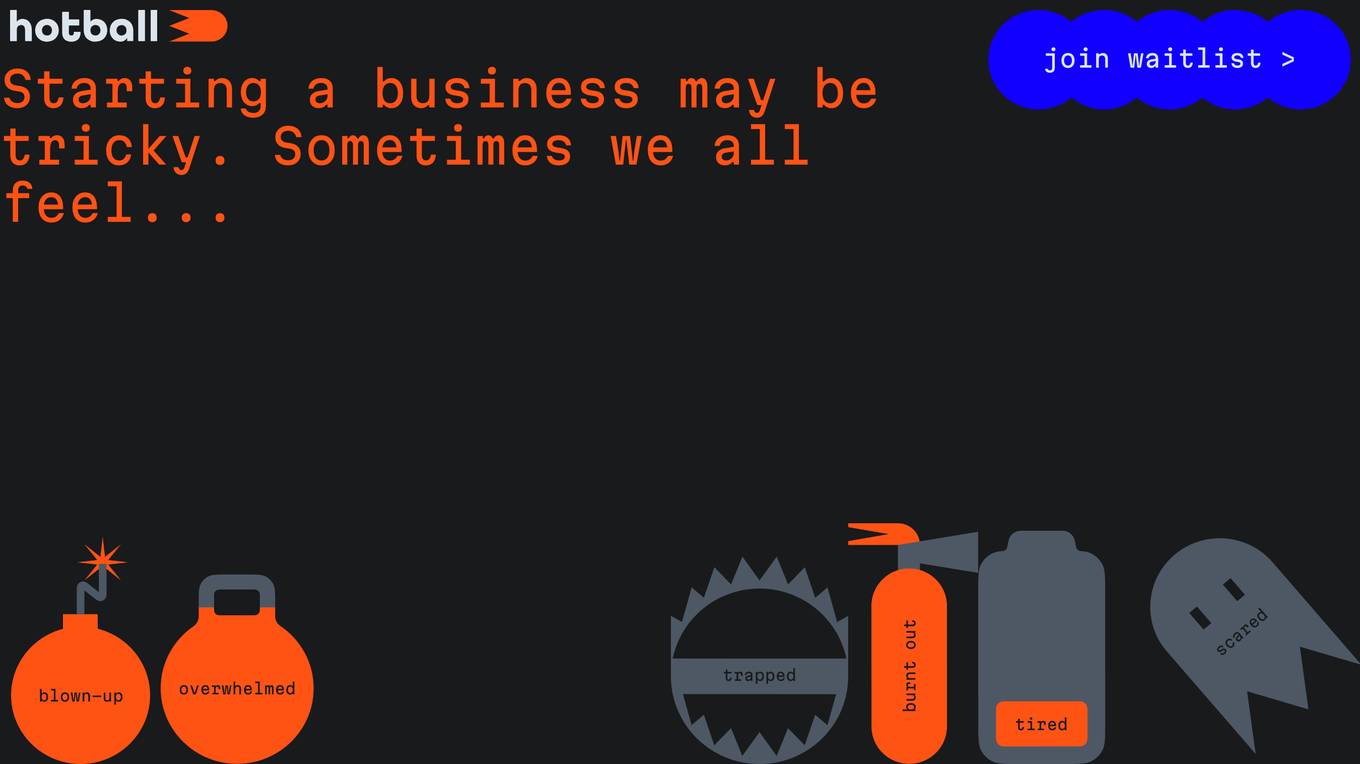
Hotball.ai
Hotball.ai is an AI-powered platform designed to help startup founders validate their business ideas and create a step-by-step plan. By leveraging AI technology, Hotball.ai assists in identifying blind spots, gaps in business plans, and provides guidance to enhance understanding and pitch preparation. The platform offers personalized AI fractional executive services, data-driven suggestions, proven business frameworks, and eliminates the need for filling out boring forms. With Hotball.ai, founders can pre-validate their business models, increase their chances of securing funding, and connect with a community of like-minded entrepreneurs.
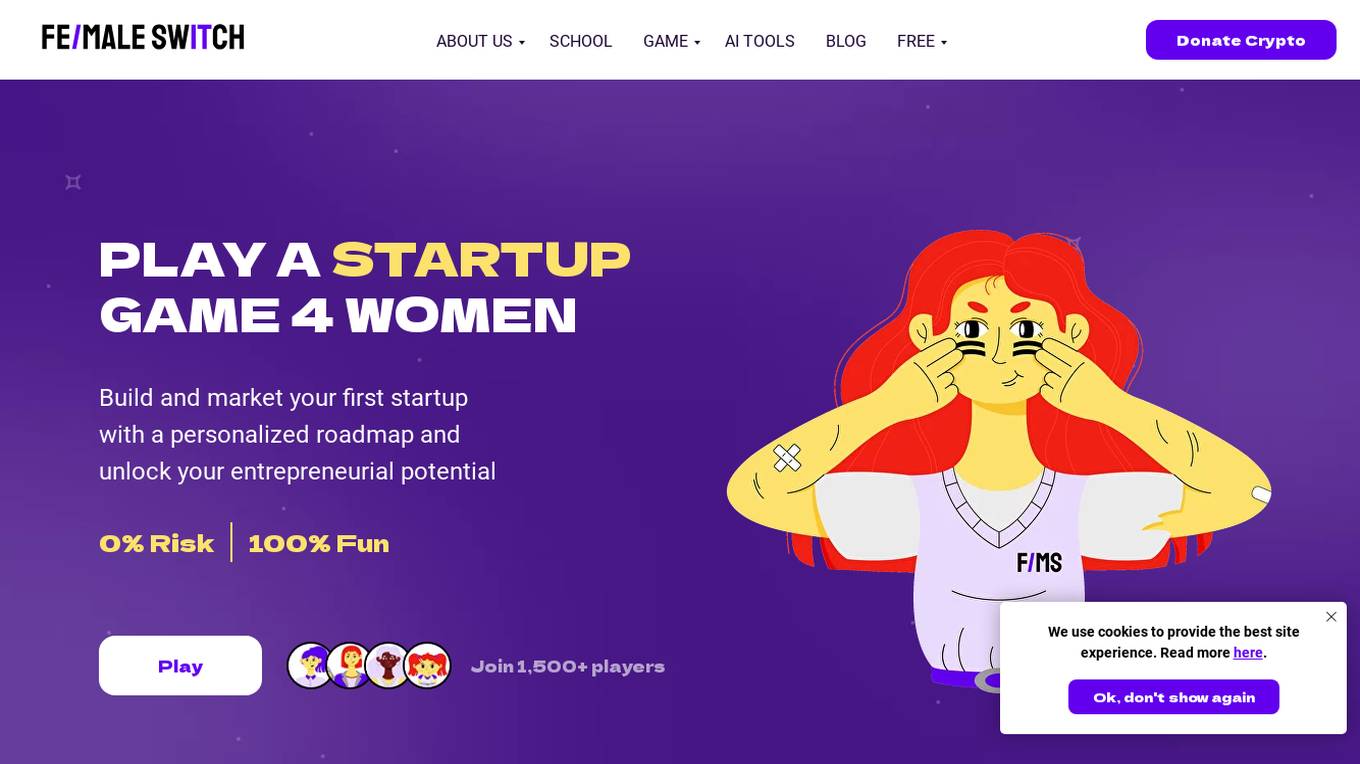
Fe/male Switch
Fe/male Switch is a women-first startup game that offers a browser-based startup simulator experience. Players can assemble a team, create a startup with an investor and mentor, gain startup experience, win prizes, and get funded. The game aims to help individuals build their first startup, validate ideas, and overcome startup challenges. It provides a platform for aspiring entrepreneurs to test their entrepreneurial potential and learn essential business skills in a risk-free environment. Fe/male Switch features a unique Gamepreneurship methodology, AI co-founder support, and educational resources to guide players through the startup building process.
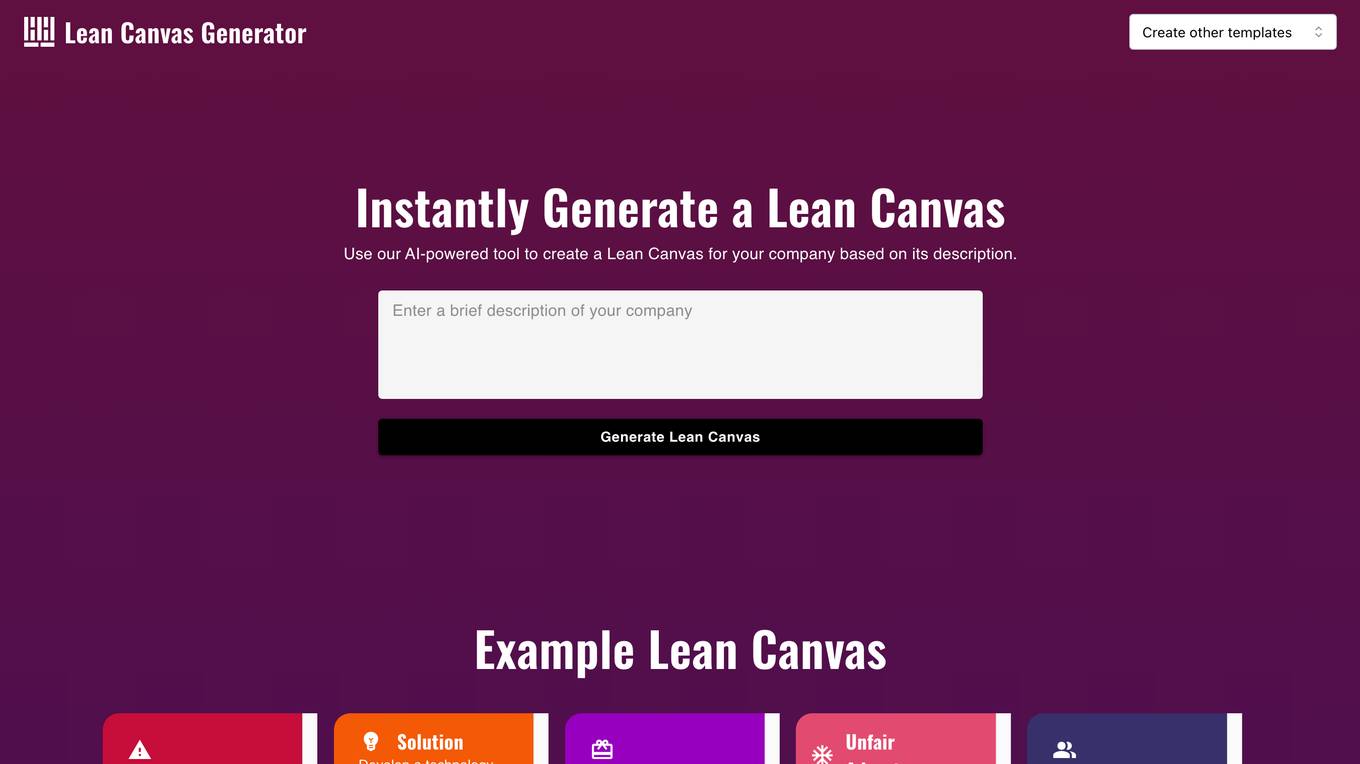
AI Lean Canvas Generator
The AI Lean Canvas Generator is an AI-powered tool designed to help businesses create Lean Canvas for their company based on its description. It simplifies the process of summarizing key aspects of a business model, such as target market, value proposition, revenue streams, cost structure, and key metrics. The tool is based on the Lean Startup methodology, emphasizing rapid experimentation and iterative development to reduce risk and uncertainty in the early stages of a business. It offers a flexible and adaptable approach to building successful businesses, often used in conjunction with customer development and agile development practices.
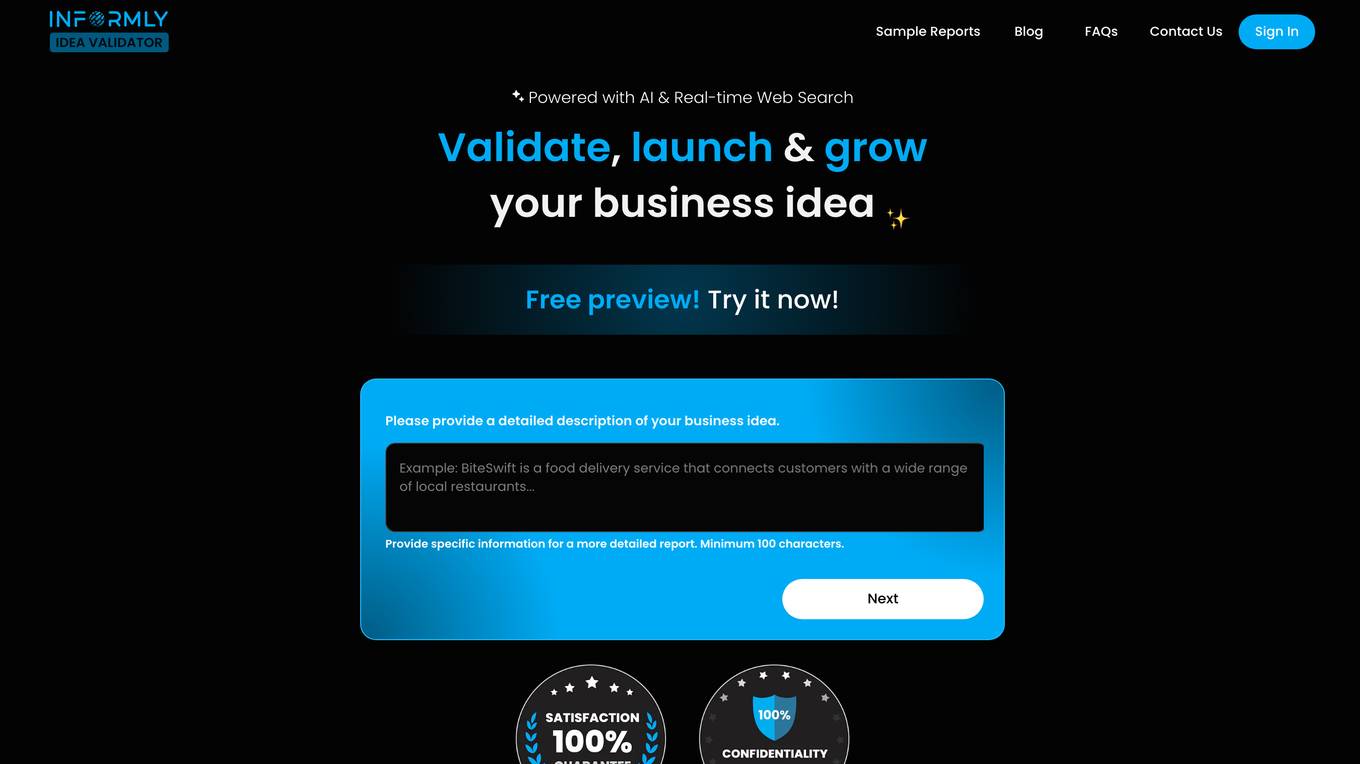
Idea Validator
Idea Validator is an AI-powered tool that helps entrepreneurs validate their business ideas instantly. It provides detailed reports on business viability, target audience, ideal team, business model, and more, all within minutes. Trusted by over 1750 entrepreneurs, Idea Validator offers a rapid turnaround time, affordability, and comprehensive insights to kick-start and grow business ideas. The tool covers all aspects of starting a business, ensuring users don't miss any critical components. With features like real-time web search integration, personalized reports, and expert business advisors, Idea Validator is a valuable resource for idea validation and development.

Lalaland.ai
Lalaland.ai is an AI-powered digital model studio for digital designers. It allows users to create realistic 3D models of people to showcase their designs. The platform integrates with Browzwear VStitcher, enabling users to style their designs on lifelike models and validate their garments early on in the design process. Lalaland.ai aims to make the fashion industry more sustainable by reducing the need for physical samples and photoshoots.
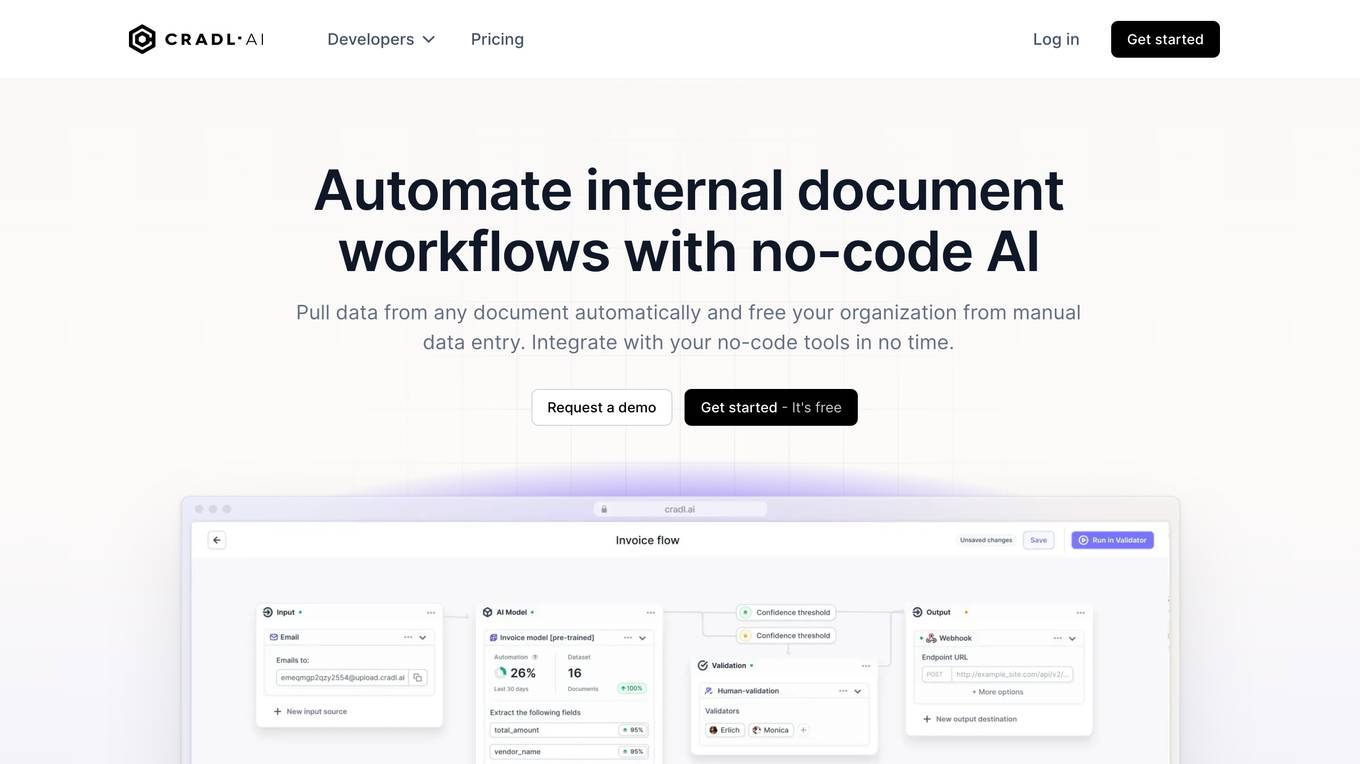
Cradl AI
Cradl AI is a no-code AI-powered document workflow automation tool that helps organizations automate document-related tasks, such as data extraction, processing, and validation. It uses AI to automatically extract data from complex document layouts, regardless of layout or language. Cradl AI also integrates with other no-code tools, making it easy to build and deploy custom AI models.
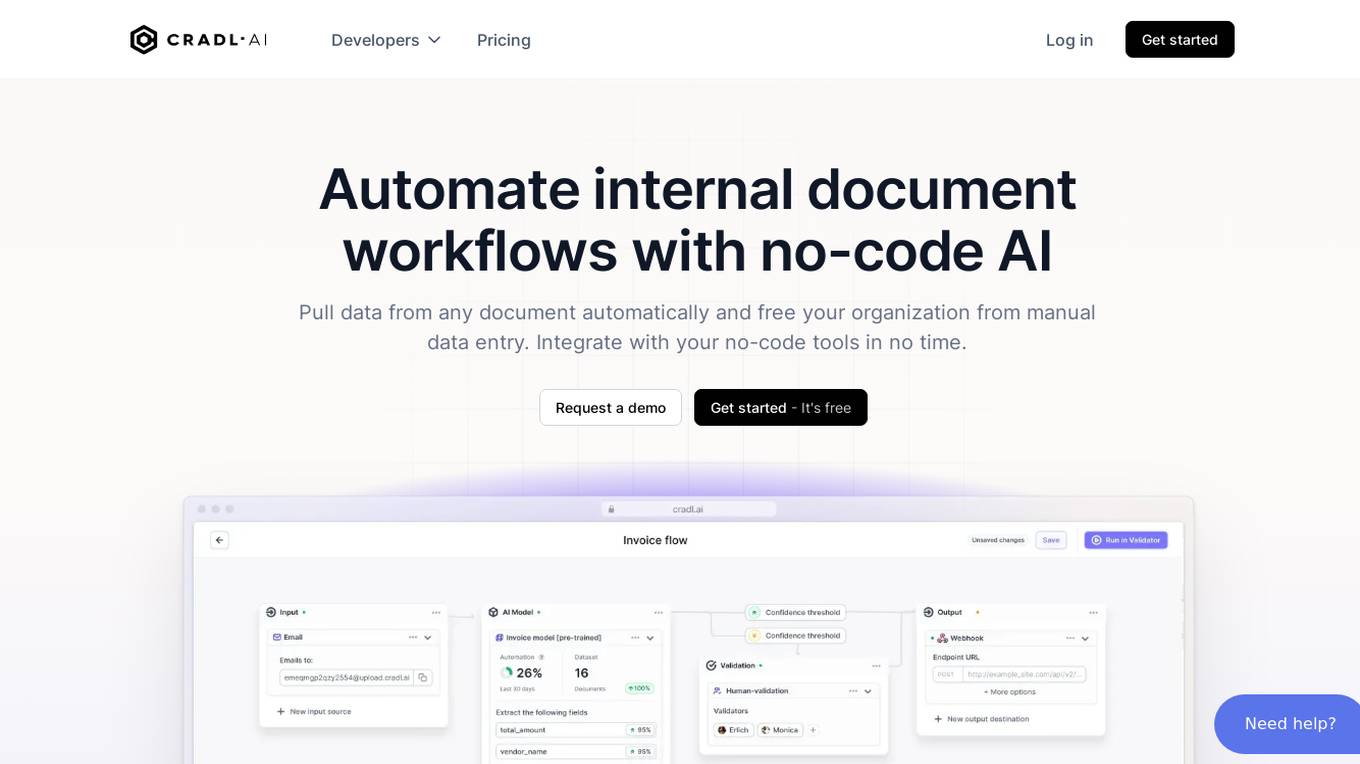
Cradl AI
Cradl AI is an AI-powered tool designed to automate document workflows with no-code AI. It enables users to extract data from any document automatically, integrate with no-code tools, and build custom AI models through an easy-to-use interface. The tool empowers automation teams across industries by extracting data from complex document layouts, regardless of language or structure. Cradl AI offers features such as line item extraction, fine-tuning AI models, human-in-the-loop validation, and seamless integration with automation tools. It is trusted by organizations for business-critical document automation, providing enterprise-level features like encrypted transmission, GDPR compliance, secure data handling, and auto-scaling.
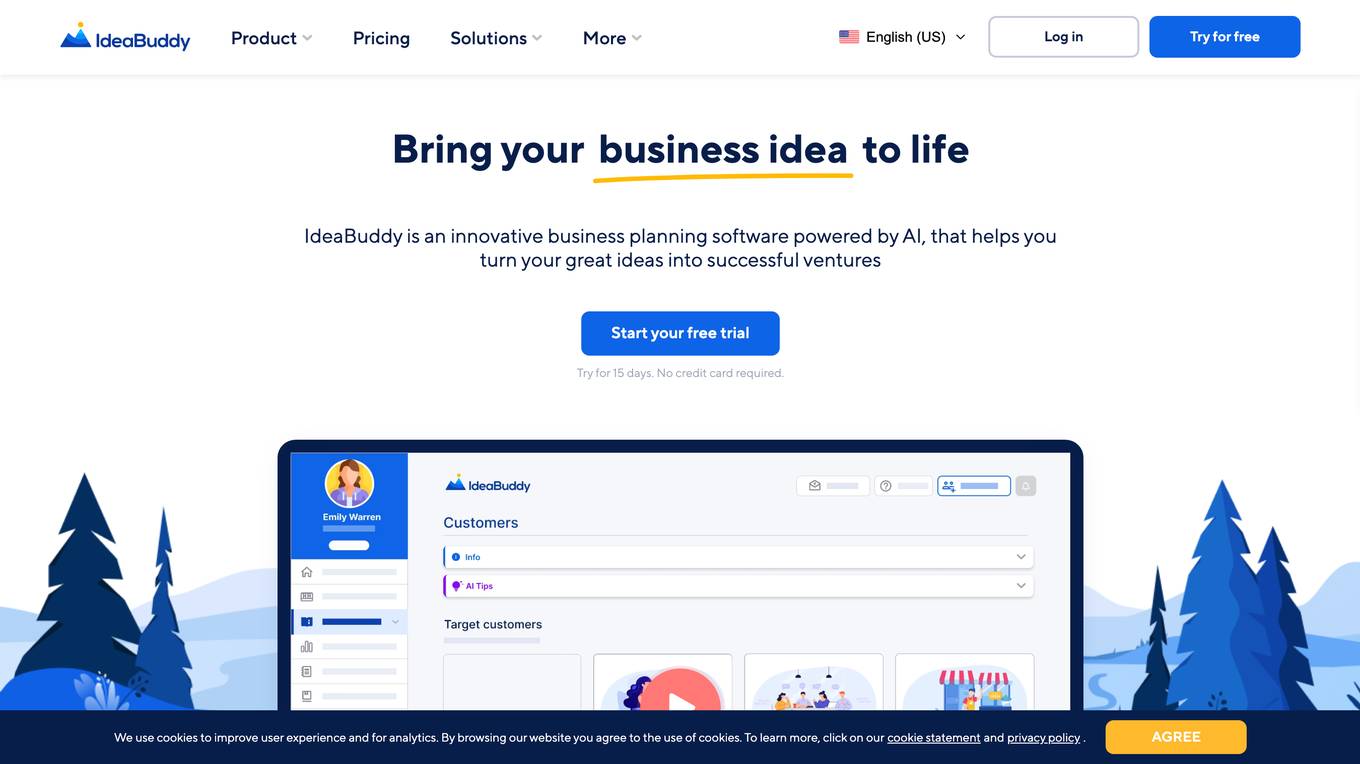
IdeaBuddy
IdeaBuddy is an innovative business planning software powered by AI that helps entrepreneurs, startups, and business organizations turn their great ideas into successful ventures. With IdeaBuddy, you can develop, test, and launch your business idea, all in one place. Whether you are starting from scratch, looking for funding, or wanting to expand, IdeaBuddy meets you where you're at.

Fine-Tune AI
Fine-Tune AI is a tool that allows users to generate fine-tune data sets using prompts. This can be useful for a variety of tasks, such as improving the accuracy of machine learning models or creating new training data for AI applications.
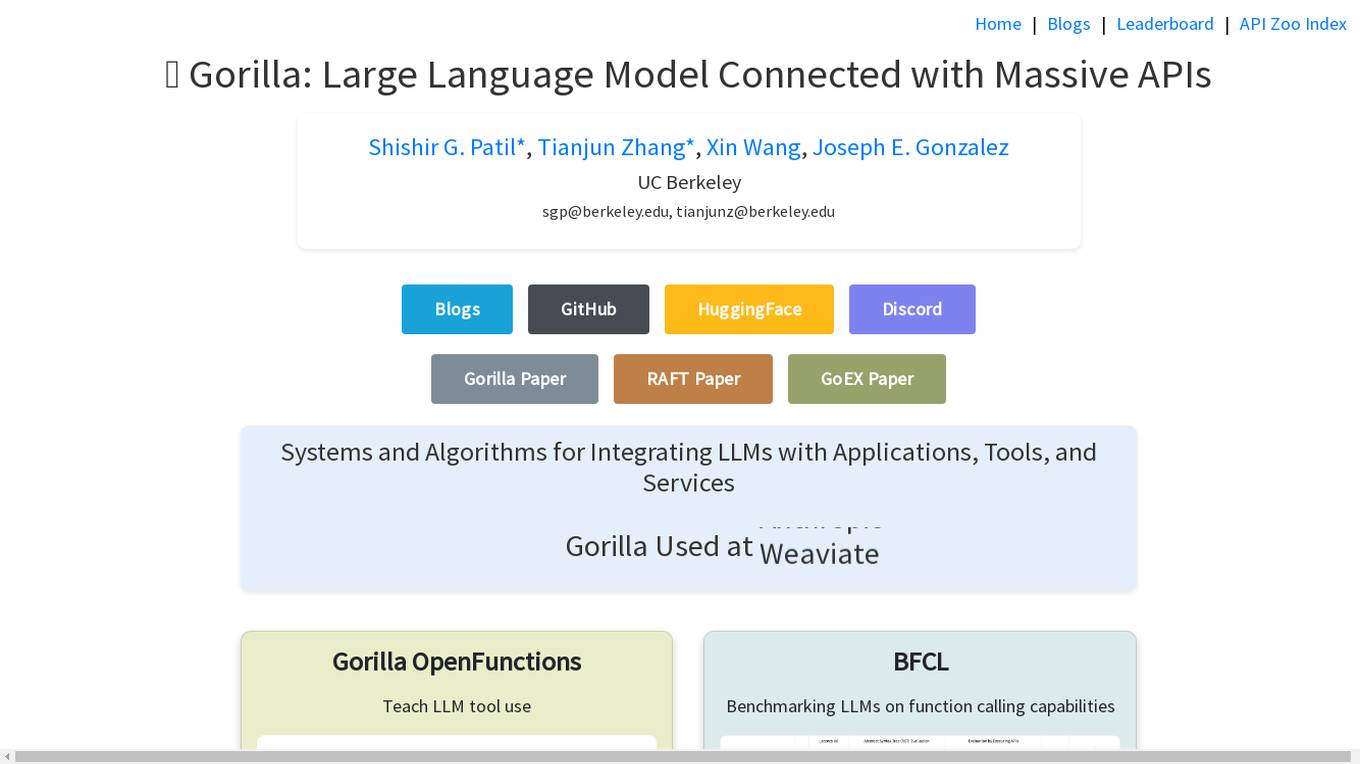
Gorilla
Gorilla is an AI tool that integrates a large language model (LLM) with massive APIs to enable users to interact with a wide range of services. It offers features such as training the model to support parallel functions, benchmarking LLMs on function-calling capabilities, and providing a runtime for executing LLM-generated actions like code and API calls. Gorilla is open-source and focuses on enhancing interaction between apps and services with human-out-of-loop functionality.
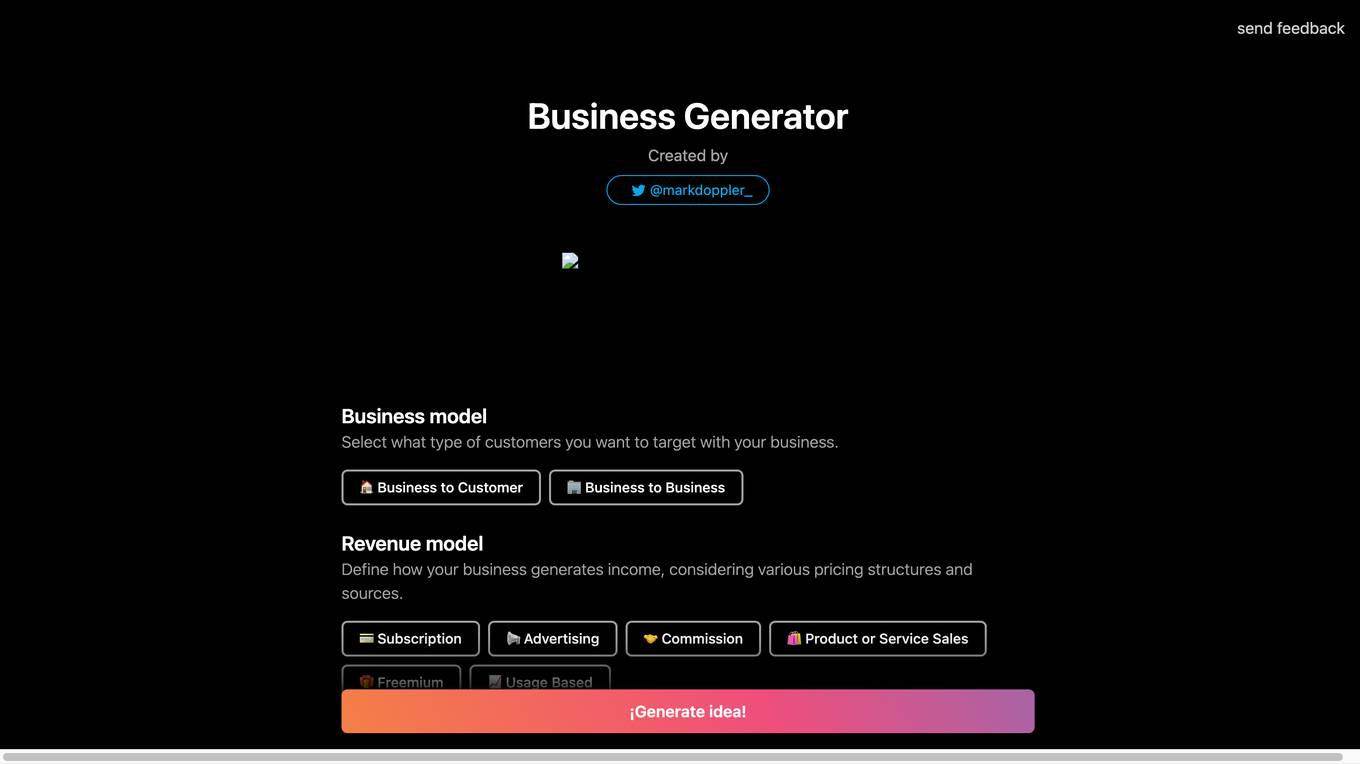
Business Generator
Business Generator is a tool that helps entrepreneurs and business owners generate ideas for new businesses. It provides a step-by-step process to help users define their target market, revenue model, technology stack, industry, investment level, competition, experience level, environmental impact, regulatory requirements, and response language. The tool then generates a list of potential business ideas based on the user's input.
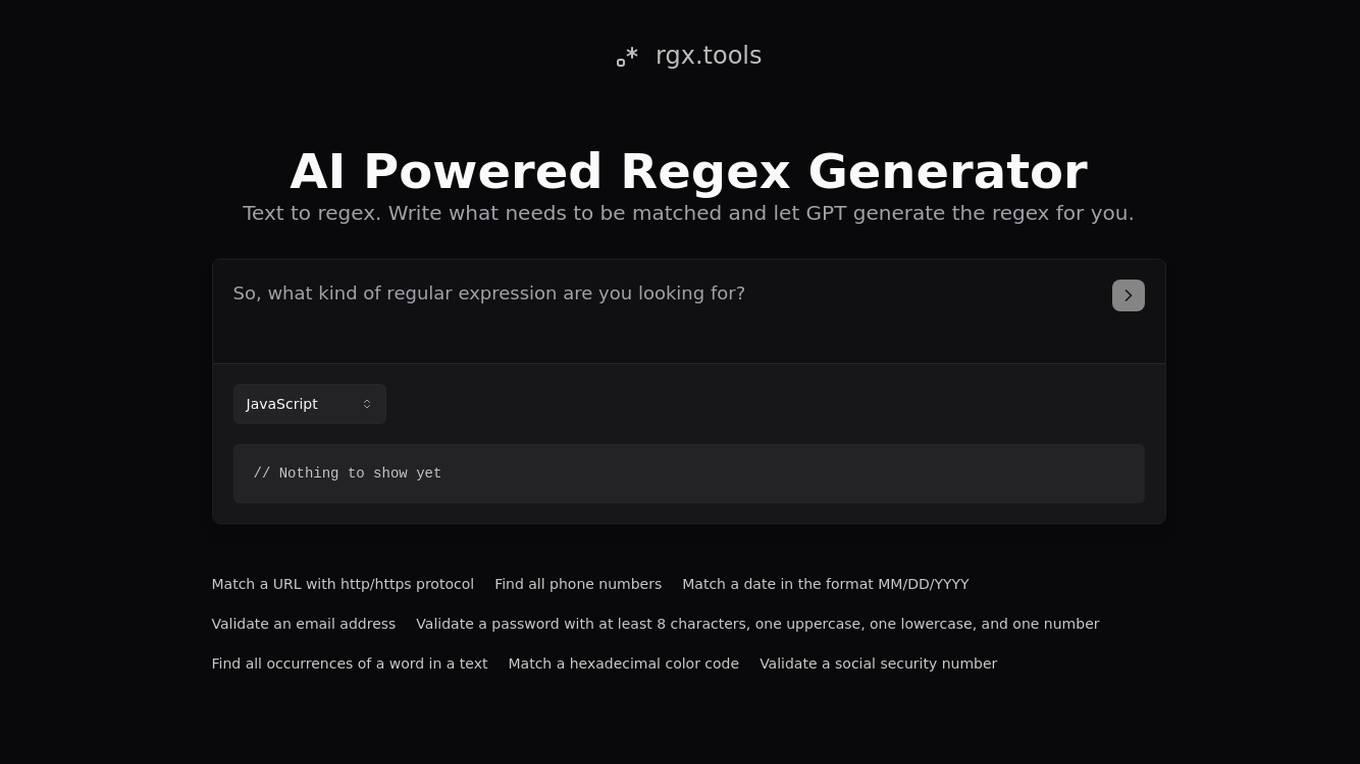
Rgx.tools
Rgx.tools is an AI-powered text-to-regex generator that helps users create regular expressions quickly and easily. It is a wrapper around OpenAI's gpt-3.5-chat model, which generates clean, readable, and efficient regular expressions based on user input. Rgx.tools is designed to make the process of writing regular expressions less painful and more accessible, even for those with limited experience.
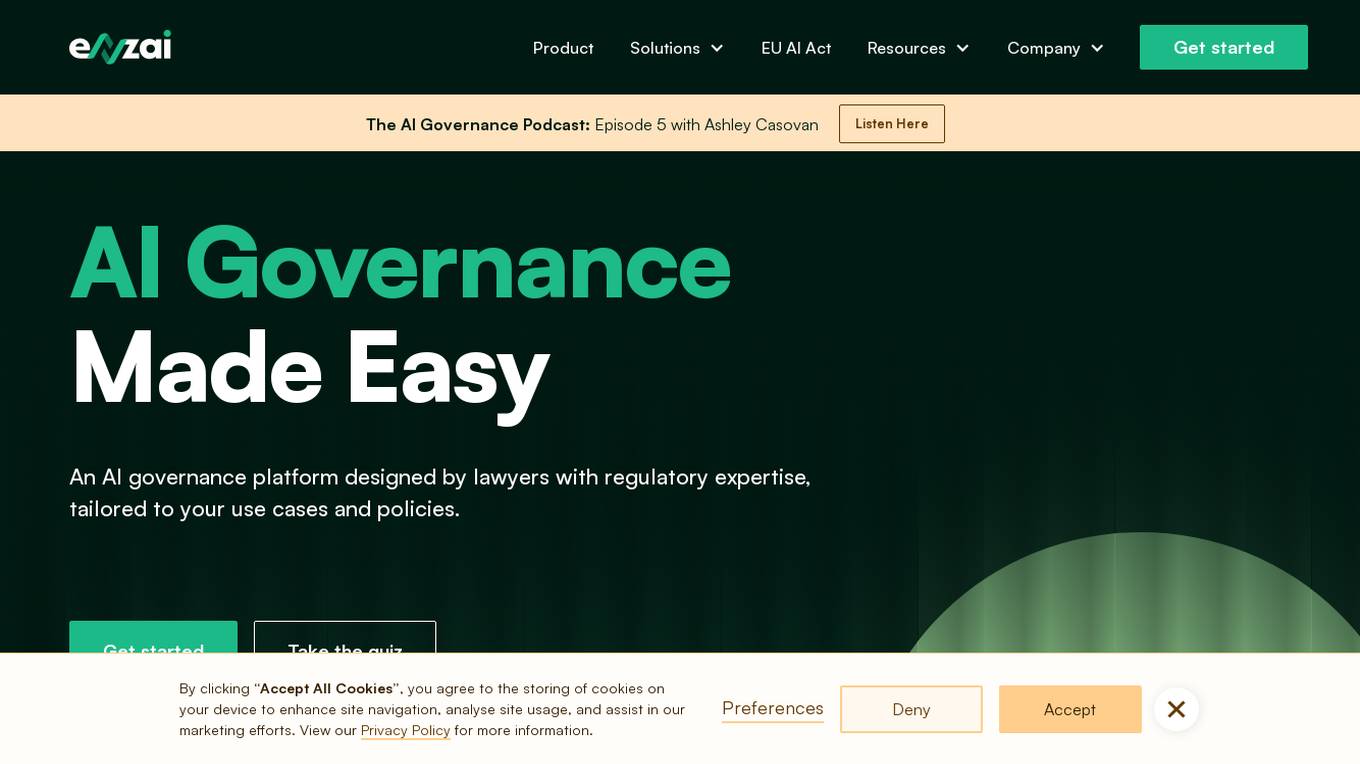
Enzai
Enzai is an AI governance platform designed to help businesses navigate and comply with AI regulations and standards. It offers solutions for model risk management, generative AI, and EU AI Act compliance. Enzai provides assessments, policies, AI registry, and governance overview features to ensure AI systems' compliance and efficiency. The platform is easy to set up, efficient to use, and supported by leading AI experts. Enzai aims to be a one-stop-shop for AI governance needs, offering tailored solutions for various use cases and industries.

Re-View
Re-View is an AI-powered platform that enables users to conduct surveys that capture more than words by utilizing user-friendly video survey forms. The platform allows users to understand emotions, uncover insights, and collect more and better data through authentic emotional connections. With features like automatic insights, efficient research at scale, stunning simplicity, and powerful research capabilities, Re-View offers a practical pricing model that makes research accessible to all. Users can easily create surveys, analyze responses with AI assistance, and gain valuable research reports to support decision-making.
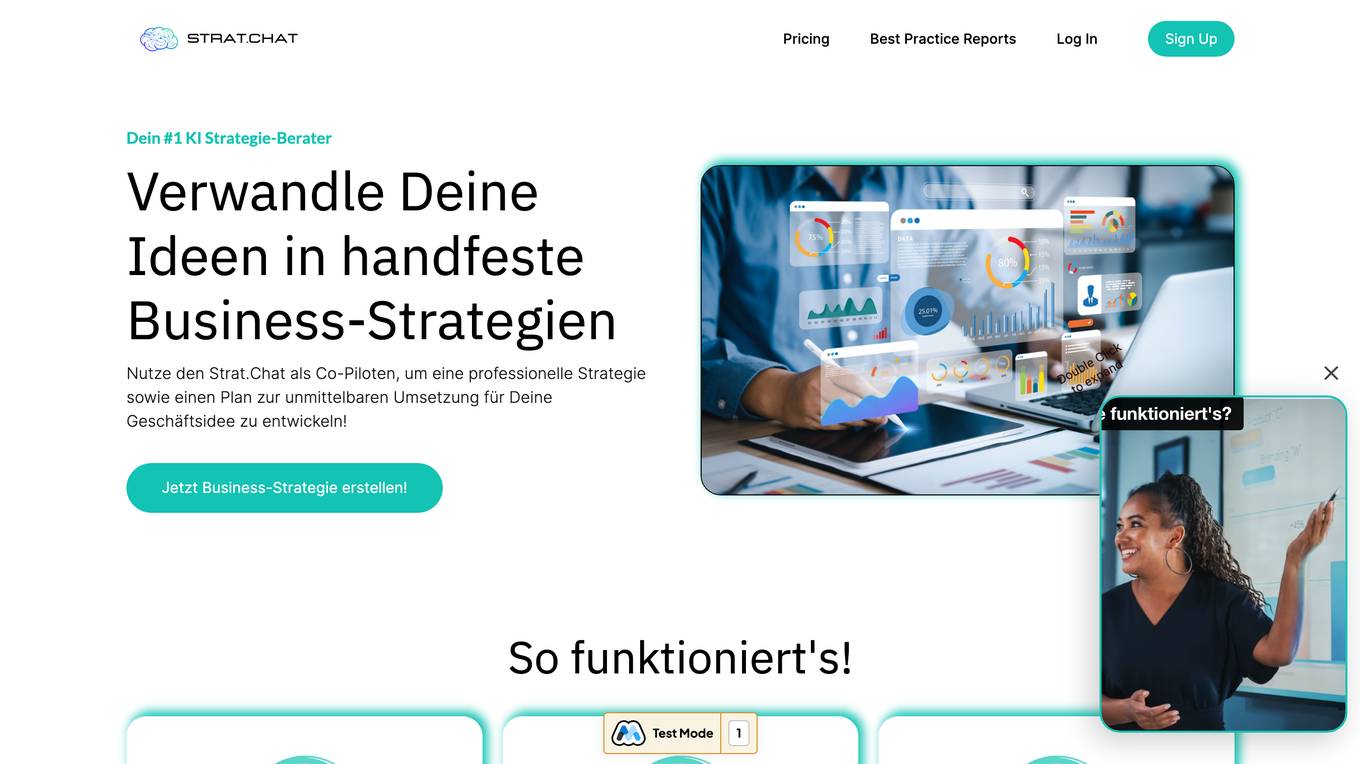
Strat.Chat
Strat.Chat is an AI-based business strategy tool that assists business owners, potential founders, and entrepreneurs in evaluating business ideas, developing implementation plans, and providing comprehensive market data. Users can describe their business idea or existing model, and the tool uses artificial intelligence to analyze it in five steps: idea assessment, industry structure analysis, macroeconomic perspective, implementation plan, and market data. The tool offers customizable recommendations and the option for a 'Deep Dive' to delve into more detailed insights.
1 - Open Source AI Tools
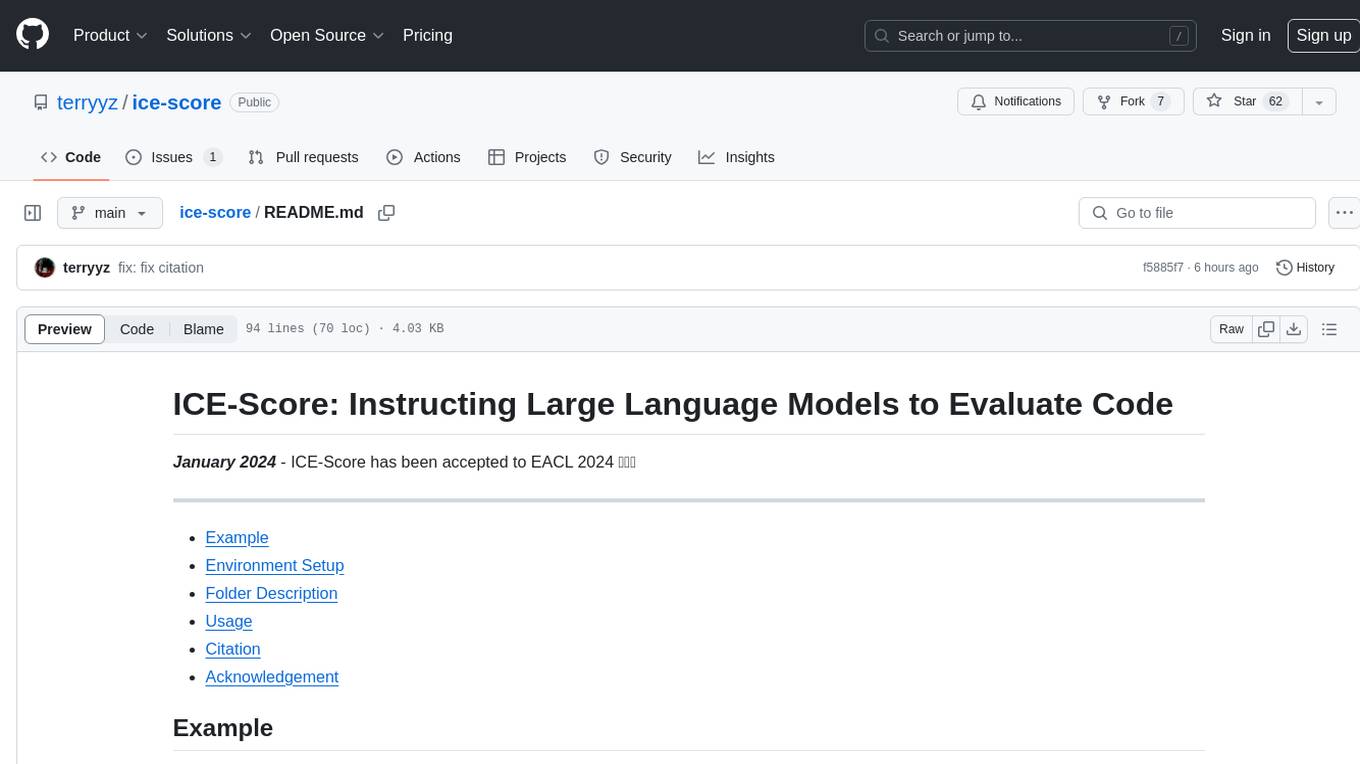
ice-score
ICE-Score is a tool designed to instruct large language models to evaluate code. It provides a minimum viable product (MVP) for evaluating generated code snippets using inputs such as problem, output, task, aspect, and model. Users can also evaluate with reference code and enable zero-shot chain-of-thought evaluation. The tool is built on codegen-metrics and code-bert-score repositories and includes datasets like CoNaLa and HumanEval. ICE-Score has been accepted to EACL 2024.
20 - OpenAI Gpts

Business Model Canvas Wizard
Un aiuto a costruire il Business Model Canvas della tua iniziativa
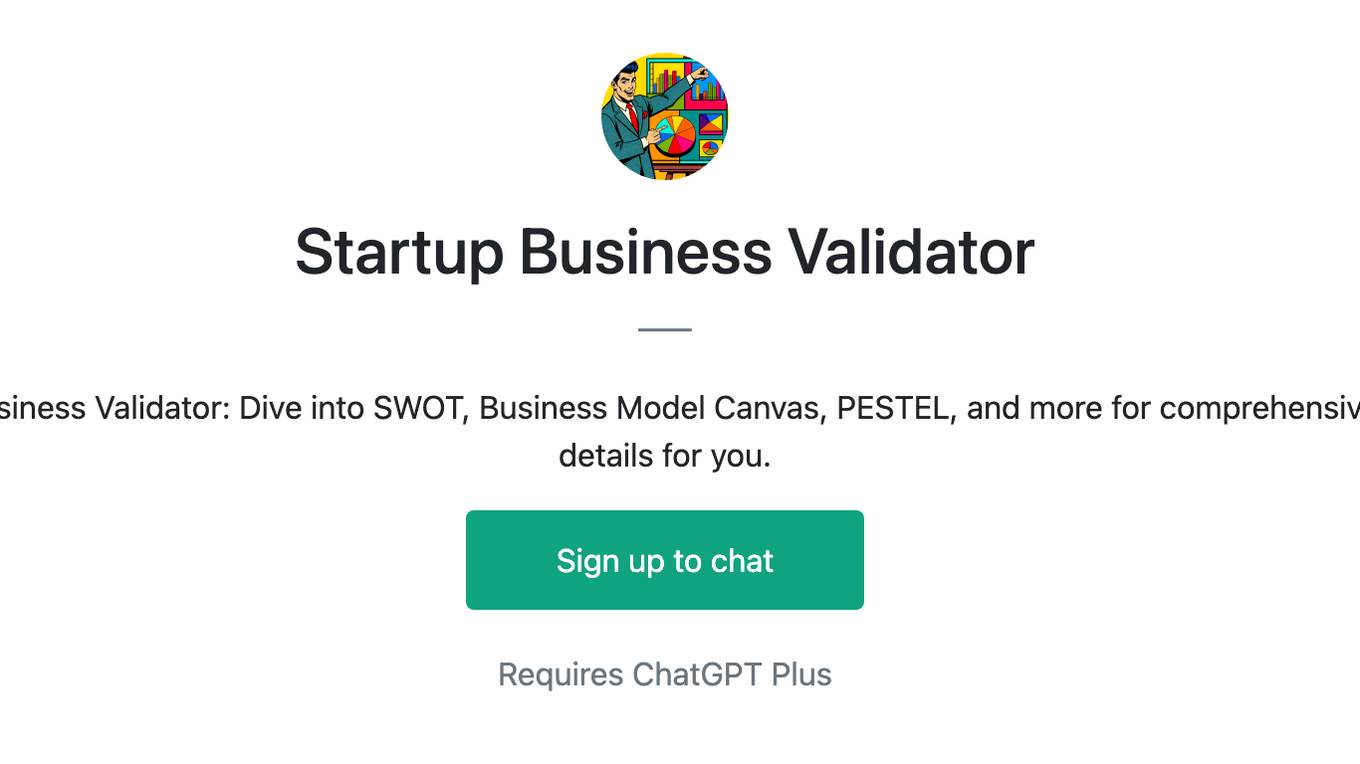
Startup Business Validator
Refine your startup strategy with Startup Business Validator: Dive into SWOT, Business Model Canvas, PESTEL, and more for comprehensive insights. Got just an idea? We'll craft the details for you.
Lean Startup Consultant
A serial entrepreneur consultant inspired by 'Lean Startup' principles.
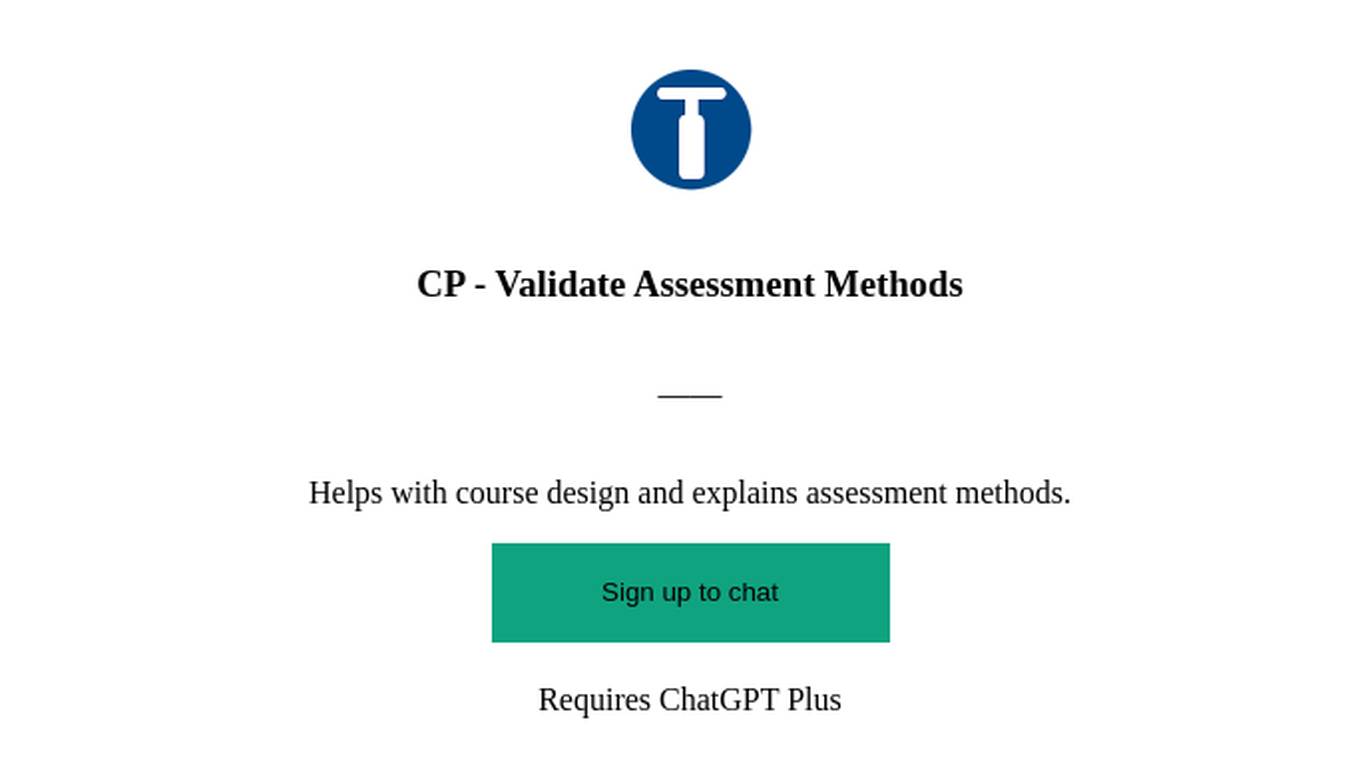
CP - Validate Assessment Methods
Helps with course design and explains assessment methods.
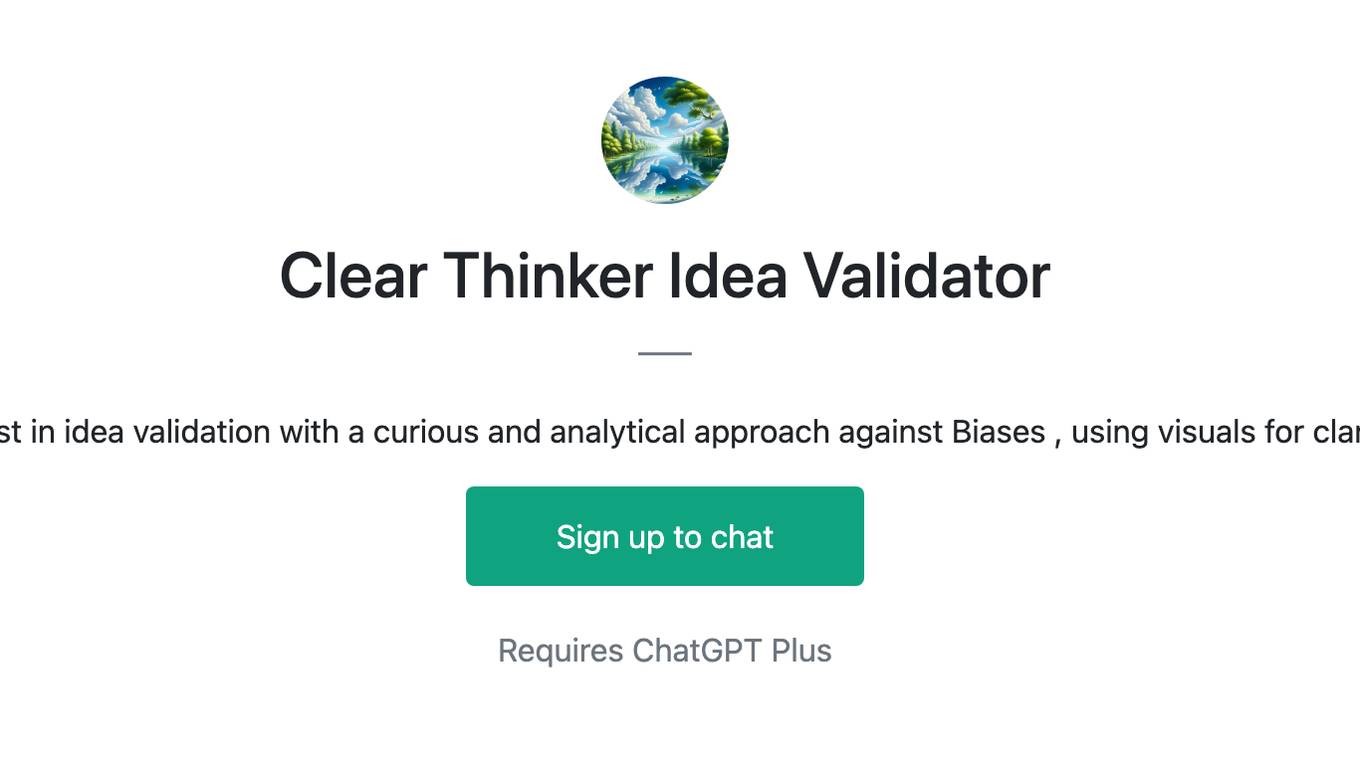
Clear Thinker Idea Validator
I assist in idea validation with a curious and analytical approach against Biases , using visuals for clarity.
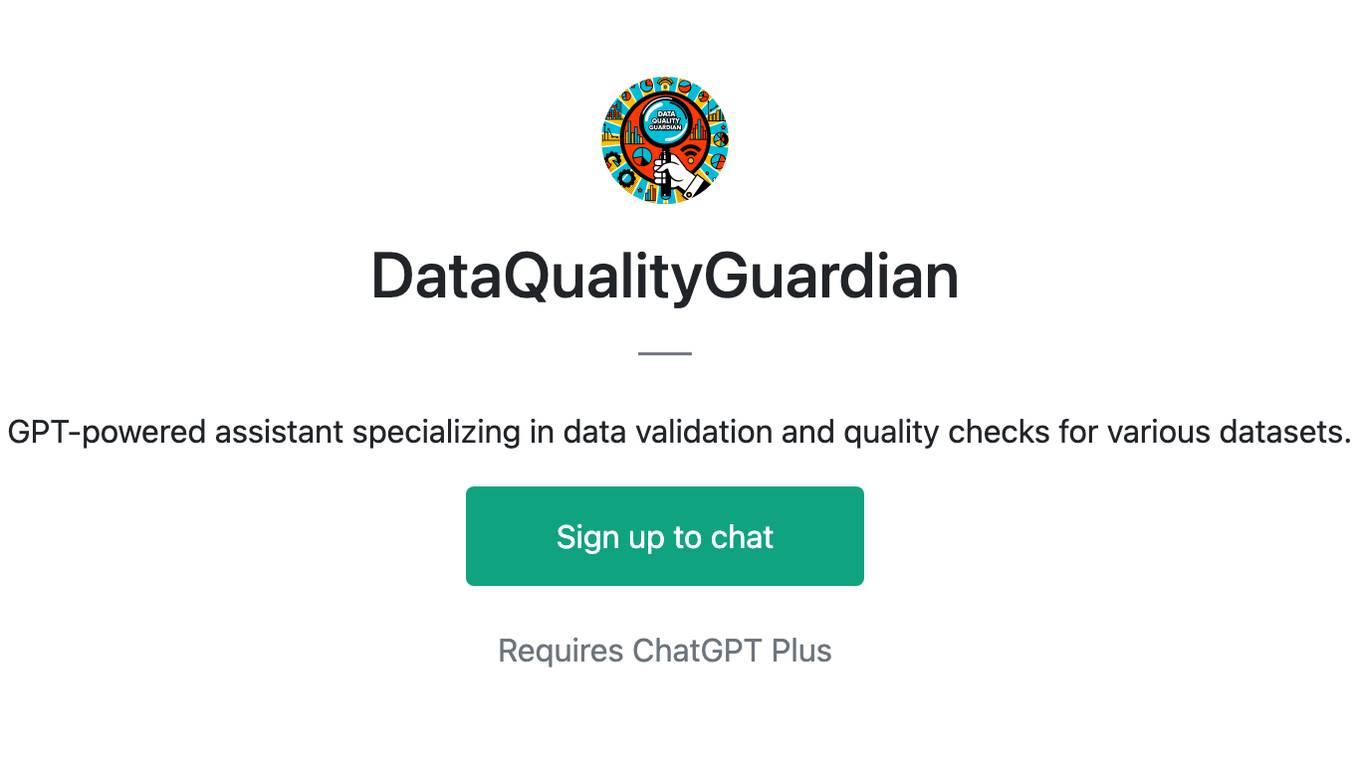
DataQualityGuardian
A GPT-powered assistant specializing in data validation and quality checks for various datasets.
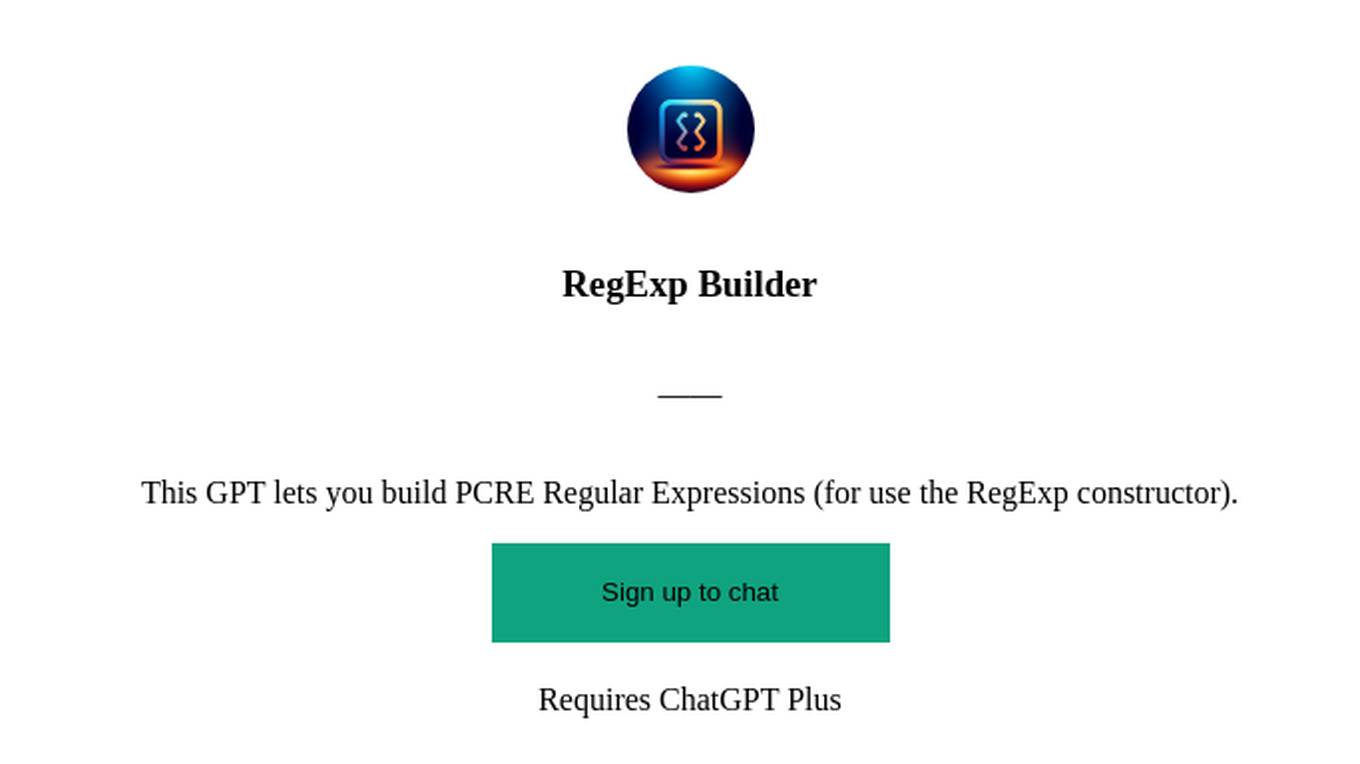
RegExp Builder
This GPT lets you build PCRE Regular Expressions (for use the RegExp constructor).

